#queen of versailles reigns again
Text
In defense for Marie Antoinette
A long time ago following a passionate debate and good reblogs that you can easily find on Tumblr (if everyone agrees I will put the link), I had fun defending Marie Antoinette (although a fervent sympathizer about the Montagnards).As in two weeks it will be the defense of Manon Roland, I will put this ability to defend to the test by publishing what I had already written about the former queen of France. Here we go:
The problem with Marie Antoinette is that her education was often neglected, and her mother, the Great Marie Thérèse, an excellent politician, instilled in her very conservative ideas, not to mention the fact that she wanted her daughter to become a spy but without the great talent political of her mother. This will be one of the reasons why it will be a great problem when she arrives at the Court.
She won't have the necessary mental strength to face the heaviness of the protocol, and although she caused major problems initially in terms of expenditure, her frankness, unsuitable for a dauphine then a queen, and her frivolity don't help. In addition to the expenses she incurs to please her friends (notably Polignac), wanting to forget the pressure her mother puts on her, despite Louis being a good husband to her, with no children, which is a source of gossip, she decides to increasingly take refuge in Trianon, which again leads to excessive spending, not to mention new clothes. But it's important to note that once she had children, she behaved much less frivolously, more reasonably, less extravagantly, but refused to reintegrate Versailles, which she deemed as heavy and hypocritical (rightly so, but as her mother said, with privileges come duties; if she had made a concession on this side, perhaps she could have obtained less absurd protocol).
Once she had children with her husband Louis XVI, they did everything to ensure that their offspring did not have a high opinion of themselves. Just look at the fact that she wanted her children to dress equally to some of the household children and in her letters indicates that she does not want her daughter to be as arrogant as her aunts. She even tells them that since there are more and more poor people in France, they won't have gifts at a certain period. So she's not a snobbish woman.
Contrary to popular belief, Louis XVI is never influenced by his wife; in fact, she herself knows how to stay in her place as a queen consort and simply prefers to organize certain festivities. But her excessive frankness, rejection of her duties, frivolity in expenditure, and the fact that she sometimes openly shows disdain, for example, for Turgot (one of the few good financial controllers of Louis XVI) will make her the object of all vices in France and a scapegoat for all the decisions of the old Regime.
Do you know who agrees on this point? The revolutionary Saint Just himself in his writings in 1792, who immediately grasped the personality of the Queen in these terms: "Rather deceived than deceitful, rather light than perjured, entirely devoted to pleasure, she seemed to reign not in France but at Trianon."
Moreover, Joséphine de Beauharnais, who was a hundred times more spendthrift and frivolous than her, was much more loved because she took care of her image unlike Marie Antoinette. Perhaps because Marie Antoinette was more frank than her .
In the end, Marie Antoinette stole less from the coffers, so to speak, because her husband wouldn't have let her, and she herself wouldn't have wanted to. Theresia Cabarrus, who profited well from Tallien's scam, was seen as wonderful because she took care of her image. Furthermore, Marie Antoinette clearly displayed her allegiance and stuck to it until the end (although this allegiance was outdated, her mother's conservative ideas about absolute monarchy), faithful to the people she loved (she insisted on sheltering her friends, but Lamballe returned despite the queen's pleas not to do so to support her, faithful to her husband, despite the arranged marriage, because even though she insisted they leave, she didn't want to leave him alone), isn't a friend of the good day only, compared to Cabarrus, who claimed to be imbued with Enlightenment ideas, said she didn't like bloodshed, but in the end, went from one bloody person to another not out of survival (as she liked to say) but out of wealth before marrying a royalist. Yet Theresia and Beauharnais (who took part in the serious scandal during the creation of the Bank of France as a shareholder) did not receive as much criticism.
Of course, we can also understand Marie Antoinette's criticism of Necker, a proud man who is content to borrow and pretend to be more competent than he really is and stabs people in the back (he criticized Turgot but if Turgot hadn't played the "villain," Necker wouldn't have been able to borrow a penny to cover his good reputation not to mention his weather vane attitude and his false attitude as a friend of the people that Marat denounced ), although I don't understand the contempt she had for Turgot.
For her betrayal towards France, I agree with all of you , it's inexcusable, I won't go back on that. What Louis XVI did (primarily him because he was never influenced by his wife, but she also has some responsibility in this regard) is involuntary mass homicide against the French people for the return of absolute monarchy. The problem is that at that time we didn't have the necessary evidence to condemn her (although there was legitim suspicion of the truth), it was a parody and even Saint Just seemed to oppose this execution by telling Robespierre that "this act (the execution) would not benefit national sovereignty." Unfortunately, the person who said this in one of the forums, however, very educated, lost the citation from this book, so let's go cautiously, especially since if the letters had been found, I think Saint Just would have been in favor of the execution of Marie Antoinette. But as mentioned above, at least Antoinette did not betray any ideals, she was clear about that unlike Cabbarus who claimed that she rejected Tallien because of the blood in his hand but then go to Barras, said that she is attired by « les idées lumières » and go to wedding a monarchist, etc., who do not receive as much criticism. But I also understand the hatred she received from Jacques Roux, from a Momoro, and from so many others who never had luxury and found her expenses and behavior legitimately scandalous. But like everyone else outraged and shocked by the behavior of Hébert (and Pache, Chaumette, and Jacques Louis David should not be forgotten even though I like Pache and I find Chaumette unfairly maligned by their best moments it’s was not their best moments and should have died of shame for using such a method, as for Hébert and even to a lesser extent Jacques Louis David, let's not even talk about them).
At least Marie Antoinette unlike other didn’t betrayals the ideas of the revolution unlike some who claimed themself child of the revolution and then betray the revolutionnaries.
If we want to fight against the dishonest people who have blamed everything on people like Saint Just, Robespierre, Couthon, Billaud Varennes (isn't Fouché and Turreau?) we must also do the same thing even for people who are against the revolution even if I agree that the martyrdom of the upper class is tiring and that making Marie Antoinette a pure feminist and innocent icon is just as wrong (but I am here to defend her in this post).
P.S.: I know that Theresia and Joséphine did not harm people unlike their husbands and lovers at least not as much; I do not want to absolve Napoleon, Barras, Tallien; they did not need these women to do what they are reproached for, but to better situate them in relation to Marie Antoinette.
30 notes
·
View notes
Note
Hello, please talk about some TV show and song recommendations. :)
I've actually been wondering for ages if you've heard of the concept musical, Lady M, which has been releasing promo songs here and there. I want to emphasize that I'm not SOLD on it, not 100%, since (1) They've only released three songs and (2) They talk about inventing "an original backstory to Lady Macbeth's villainy and downfall" and they how "chilling flashbacks of her haunted past are woven into this reimagining of the famous tale", and that sort of thing can go either really, really well or really, really badly (I am begging people, she doesn't NEED a tragic backstory, especially if it ends up being trauma porn), BUT Lady Macbeth's song, "What Must Be Done", DOES fuck. If the rest of the musical ends up being garbage, I'll still have this song.
Another concept musical that I've been really impressed with (and now has had a concert performance that was recorded and is available on Spotify, so I can judge it more accurately) is Treason: The Musical. I've been supporting this musical since 2021, so I've been very interested to see whether this would do well or whether it would be one of those musicals that get a bit of traction and then burn out. It seems, at first glance, to be one more cynical Hamilton rip-off (not to name names...but. You know. You Know™), and I think that it WAS born from the Hamiltrend, in the sense that I don't think it would have been created without it. But it has its own unique folk sound that sets it apart; it isn't mindlessly following the trend, and honestly I would say that the weakest parts of the show are the moments where it DOES sound like Hamilton (namely, James (V)I's parts). They even use the lyrics to one of my folk songs, "The Unquiet Grave/Cold Blows the Wind" as a bookend to the musical -- and it's impressive that I LIKED it since I'm a die hard proponent for the "Dives and Lazarus" musical setting for the song (most non-D&L settings are...boring, which is criminal in a song about a ghost coming from the grave to tell her boyfriend to stop crying over her.) Favorite songs include: When Will I See You Again, Blind Faith, Burn, The Day Elizabeth Died, No Happy Ending.
Finally, no song/musical recommendations list of mine would be itself without me plugging my beloved Marie Antoinette: The Musical, specifically the 2.0 version (DO NOT watch the German, I BEG you, if you want to have any affection for the musical left). It features my favorite feral gremlin musical lady protagonist, Margrid Arnaud, who we're first introduced to when she splashes champagne on the Queen of France, and she only gets more unhinged from there. She's everything that people say they want from a female Blorbo -- She's pathetic, she cries on stage over a situation she absolutely partially caused, she might or might not be fucking the king's scheming goth cousin while pining for Marie Antoinette's boytoy, she has daddy issues, she has mommy issues, she has half-sibling issues, she leads a mob to Versailles, she commits perjury and gets off free during the height of the Reign of Terror, she calls down the wrath of God on the aristocrats. She's like Madame Defarge on speed with positive character development. Literally no one is doing it like her. Have some of Margrid in her natural element, from the Korean proshot (which I'm not legally allowed to say whether I have a copy of it.)
Speaking of Storming Versailles, have some Je Veux le Monde from 1789 -- every single production of 1789 has had Woman Problems in some capacity (hilariously enough, NEVER the same Woman Problems, so you get to pick your poison), but the song fucks.
11 notes
·
View notes
Photo

Kristin Chenoweth Is the 'Queen of Versailles' Now
Save any loose change before the presale hits for Kristin Chenoweth's new musical!Chenoweth has been cast as Jacqueline Siegel — the "Queen of Versailles" — in a new musical adaptation of her life. An official synopsis reads: "From computer engineer to Mrs. Florida to billionairess, Jackie sees herself as the embodiment of the American Dream." However, "with the Great Recession of 2008 looming," the musical will see her dreams crumble, along with her and husband David's "lavish lifestyle."The show, produced by Chenoweth and Bill Damaschke, will dive into "'the true cost of fame, fortune and family' first told in filmmaker Lauren Greenfield's wildly astonishing 2012 documentary." Seeing as this is literally a musical about Siegel's life, Chenoweth and the self-styled queen officially met in Naples over the weekend. See on Instagram On Instagram, Siegel wrote of the encounter: Well, you guys! 💋 I met @kchenoweth this weekend, and she is everything I imagined and more! ✨ There is a reason she is the queen! 👑 Kristin was performing in Naples at @artisnaples! I had goosebumps during every song, and afterward, I got to meet her! Talk about being star-struck! She is so sweet, and I felt like I'd known her forever! 💗 I still can't believe she’ll be playing me!!! 🎶 What a year this is going to be!!!❤️👸💋Recently, Siegel starred in the Discovery+ followup to 2012's The Queen of Versailles, called The Queen of Versailles Reigns Again. It was an interesting move by her and husband David, often known as "The Timeshare King," considering his corporation Westgate Resorts had sued the original documentarian for their portrayal in the original flick. Filmmaker Lauren Greenfield won that lawsuit in 2014 after an arbitrator for the Independent Film and Television Alliance found that the doc wasn't defamatory. Even more, Siegel was on the hook for $750,000 in legal fees racked up during the case. Shockingly, Greenfield also revealed in an interview this week that she and the Siegels were producing the musical together. "I’m just really excited that, you know, 10 years later, we’re all happily involved in this musical that I can’t wait for audiences to see."Photo by John Parra/Getty Images for The Queen of Versailles
https://www.papermag.com/jackie-siegel-kristen-chenoweth-2659667139.html
#Kristen chenoweth#Jackie siegel#Documentary#Musical#Broadway#The queen of versailles#Joan Summers#PAPER
1 note
·
View note
Text
JACOBIN FICTION CONVENTION MEETING 26: MADAME TUSSAUD: A NOVEL OF THE FRENCH REVOLUTION
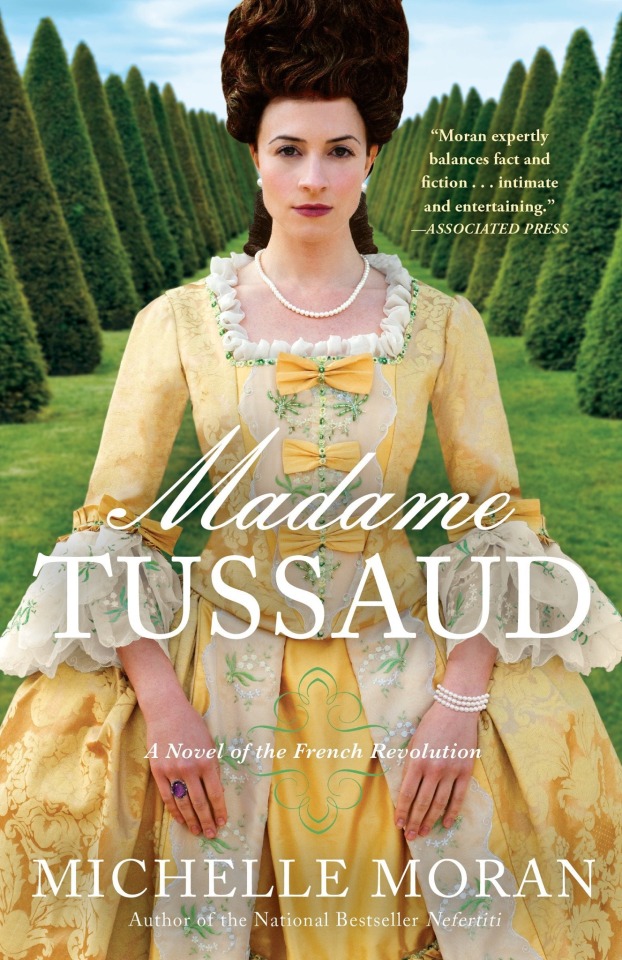
1. The Introduction
This review is dedicated to @maggiec70, @tairin, @pobodleru and @xiranjayzhao .
Greetings, Citizens, and surprise!
Don’t worry, I didn’t call an emergency meeting because the pesky Thermidorians are plotting against us (although we are going to make fun of them because of course we will), but rather because this is a special surprise review I for all you!
Oh, and Happy Easter to those who celebrate it.
Anyway, we’re back at roasting analyzing Michelle Moran’s books. Much like The Second Empress, Madame Tussaud offers a lot to talk about, but while the former book was suggested by @maggiec70 , this one I decided to review on my own accord.
Boy was that a wild ride, but we’ll get to that later. Once again, I managed to find an ebook online because, especially after the rodeo with The Second Empress, I didn’t feel like paying for this shit and it turned out to be a wise decision.
Those who are curious can find the online version here. But for now, let our surprise meeting begin!
2. The Summary
The summary comes from Goodreads and it is rather lengthy, but here we are:
“The world knows Madame Tussaud as a wax artist extraordinaire... but who was this woman who became one of the most famous sculptresses of all time? In these pages, her tumultuous and amazing story comes to life as only Michelle Moran can tell it. The year is 1788, and a revolution is about to begin.
Smart and ambitious, Marie Tussaud has learned the secrets of wax sculpting by working alongside her uncle in their celebrated wax museum, the Salon de Cire. From her popular model of the American ambassador, Thomas Jefferson, to her tableau of the royal family at dinner, Marie's museum provides Parisians with the very latest news on fashion, gossip, and even politics. Her customers hail from every walk of life, yet her greatest dream is to attract the attention of Marie Antoinette and Louis XVI; their stamp of approval on her work could catapult her and her museum to the fame and riches she desires. After months of anticipation, Marie learns that the royal family is willing to come and see their likenesses. When they finally arrive, the king's sister is so impressed that she requests Marie's presence at Versailles as a royal tutor in wax sculpting. It is a request Marie knows she cannot refuse - even if it means time away from her beloved Salon and her increasingly dear friend, Henri Charles.
As Marie gets to know her pupil, Princesse Élisabeth, she also becomes acquainted with the king and queen, who introduce her to the glamorous life at court. From lavish parties with more delicacies than she's ever seen to rooms filled with candles lit only once before being discarded, Marie steps into a world entirely different from her home on the Boulevard du Temple, where people are selling their teeth in order to put food on the table.
Meanwhile, many resent the vast separation between rich and poor. In salons and cafés across Paris, people like Camille Desmoulins, Jean-Paul Marat, and Maximilien Robespierre are lashing out against the monarchy. Soon, there's whispered talk of revolution... Will Marie be able to hold on to both the love of her life and her friendship with the royal family as France approaches civil war? And more important, will she be able to fulfill the demands of powerful revolutionaries who ask that she make the death masks of beheaded aristocrats, some of whom she knows?
Spanning five years, from the budding revolution to the Reign of Terror, Madame Tussaud brings us into the world of an incredible heroine whose talent for wax modeling saved her life and preserved the faces of a vanished kingdom.”
While the summary itself already has traces of propaganda, I think it’s still too early to pass judgment so let’s move on, shall we?
3. The Story
I have to say that the concept of telling the story of a real person, especially a woman like Madame Tussaud, is a cool concept. Someone who isn’t really a Royalist or a Revolutionary, but rather an ordinary businesswoman doing what she can to survive in a turbulent epoch and keep her business afloat.
We already have a shortage of Frev stories about women of the era, after all, let alone ordinary ones like Madame Tussaud who weren’t prominent fighters for a specific cause. Unfortunately, this attempt at telling such a story fails worse than me when I try to play Just Dance. Let me explain.
First of all, the pacing is all over the place. At first (about 10 or so chapters in the beginning) it’s extremely slow, with each chapter taking up about a day. After the events of Frev begin to pick up, however, there are pretty big time skips (several months in between chapters) and the pacing flashes by like a fucking cheetah on a hunt, which is definitely annoying to say the least!
Also, much like The Second Empress, this book takes this infuriating and oversimplified “black vs. white” approach to history. Revolutionaries are all evil (except Desmoulins and Danton), royals are all saints, Frev is bad... you get the idea, Citizens.
There’s no nuance that would allow readers to form their own opinions and all the usual Thermidorian propaganda is almost spoon fed to the audience. It gets so absurd too! For example, at one point doctors show up to check Marie’s virginity because they suspect that she has a lover abroad and could therefore be a spy.
Next, I find it a bit unrealistic that all the future prominent revolutionaries (or at least Camille, Marat and Robespierre) just happen to hang out with Marie (that’s the future Madame Tussaud) and her family and be buddies with them. Maybe I’m wrong, but I just find the setup hard to believe, especially considering the fact that Marat (apparently) didn’t even know Robespierre personally at that point (late 1788) so it’s also inaccurate as fuck.
And, as was the case in The Second Empress, things get quite predictable, even if it’s a given that Marie will survive (her real counterpart did), so it’s not really interesting to watch her story unfold.
But hey, at least we don’t have annoying flashbacks and letters breaking the immersion now! Yay!
4. The Characters
I don’t like Marie herself as a protagonist. Or rather, I don’t like the way she is written here. We do see that she is an ambitious, stubborn businesswoman but it’s not enough to sympathize with her and she is pretty bland otherwise. In fact, due to the opinions she expresses throughout the story, I sometimes get the feeling that she is acting as the author’s avatar/self-insert who is there to regurgitate the author’s bias, because this goes beyond what could be excused as the character being biased.
Henri Charles, Marie’s probably fictional love interest, is also bland so I don’t have much to say about him either.
Madame Élisabeth (the king’s sister) is a pretty pleasant woman but she is portrayed in a “too good for this sinful world” kind of way, as is the rest of the royal family, so she unfortunately lacks even a semblance of complexity that most real people have.
The royal couple is the same way and their flaws are barely touched upon. They’re poor misguided saintly figures ™️ and that’s about it.
Robespierre... whoo boy. This book goes with the classic “he went mad with power and became paranoid” narrative, which is what LRF did. He is portrayed as a dictator who is ready to murder everyone, condones the massacres in Lyon and the elimination of all religion (which is all kind of inaccurate), publicly breaks up with his (implied) lover and humiliates her only to cultivate his image as the Celibate Incorruptible... Oh, and there’s absolutely no mention of the fact that he tried to rescue Madame Élisabeth (yes, the sister of the king).
Marat is treated like a paranoid madman from the beginning and his assasination is implied to be a good thing. Here he is also dirty, disgusting and has no table manners apparently.... Oh and also Marie questions how could Simone be married to him, which gives me unpleasant flashbacks to The Second Empress (the way that shit treated Caroline Murat is atrocious), which is never a good thing.
Can’t judge Jefferson or Lafayette’s cameos, but they’re heroic here, especially Lafayette... By the way, Moran is from the USA, so that probably explains a lot!
Camille and Lucile are heroes and Camille’s siding with Danton is framed as them taking a brave stance against Robespierre. Ugh...
Danton is, predictably, also a hero.
Okay, let’s move on before my sanity leaves the chat.
5. The Setting
Versailles is described with at least surface level accuracy but otherwise the author tries to drive home the point that Paris during Frev was Hell.
Unfortunately, there’s not enough descriptions of places other than the palaces, which really doesn’t help my already nonexistent immersion. At all.
6. The Writing
Oh god, the annoying first person present tense again! Here it makes even less sense than in The Second Empress because the prologue takes place AFTER the main story, yet present tense gives the impression that the main character just narrates everything she is doing in real time, which... *broken computer noises*
Also, some of the French terms aren’t translated which made me scroll through google.
Next, there’s the same “Mistress of the Robes” mistake as in The Second Empress! For those in the back, that position existed in the British court but not the French one! The French have Dame d’Honneur as the equivalent position.
Oh, and also the word “lesbian” is used once in its modern meaning, which apparently wouldn’t be a thing until the 20th century, so there are also (possible) anachronisms.
And there’s at least one incorrect date, like Marat beginning to publish his newspaper on September 7th, 1789 and calling it L’Ami du Peuple (The Friend of the People) right off the bat. But in reality he began to publish his newspaper on September 12th and at first it was called Le Publiciste Parisien (Thé Parisian Publicist) before being renamed several days later.
I know some people might think these anachronisms are no big deal, but they actually are because they demonstrate the author’s attitude to research and the audience. And if these things are an afterthought, then what else did Moran get wrong in possible hopes her audience will just eat up anything she spouts without question?
Readers aren’t idiots and researching even what seems like small details is extremely important as it’s on the author to stay as close to the truth as possible since audiences tend to believe those authors! And this is what concerns me the most: the fact that there are people who will believe Moran and form inaccurate opinions based on Thermidorian propaganda.
*sigh*
But I guess, c’est la vie...
7. The Conclusion
Alright, Citizens, as you may have guessed, I would never recommend this book.
The pacing is inconsistent, the characters are mostly one note like we’re in a damn cartoon, the inaccuracies are through the roof and it’s basically the rehashing of the same propaganda the Frev community is trying to debunk.
But, with this review out of the way, let’s conclude the 26th meeting of the Jacobin Fiction Convention. Happy Easter to those who celebrate it, Citizens!
Oh, and please stay tuned for updates. They’re coming soon.
Love,
- Citizen Green Pixel
#frev#french revolution#history#frev art#maximilien robespierre#jacobin fiction convention#frev literature#michelle moran#madame tussaud 2011#camille desmoulins#georges danton#lucile desmoulins#jean paul marat#marie tussaud#madame elisabeth#marie antoinette#louis xvi#marquis de lafayette#jefferson
58 notes
·
View notes
Text

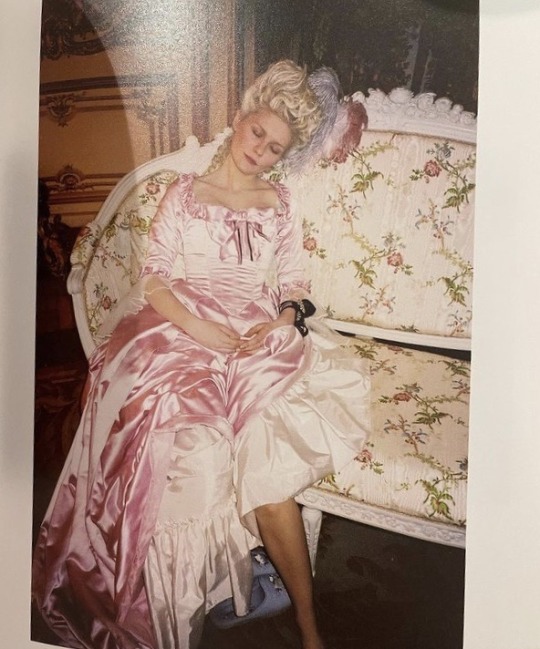
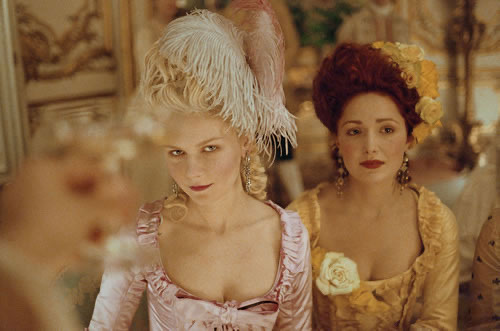
(Note: I did a post on this scene a while back but I decided to revisit it with additional analyses and the true script pages attached.)
Scene 82 from the original 2004 script for Sofia Coppola’s Marie Antoinette (2006) is one of several that ended up being cut from the film. We know that it was shot thanks to several promotional stills and behind-the-scenes photographs that have surfaced over time (we got the famous photos of Kirsten smoking in costume from the shooting of this scene — one of the first glimpses we got of the production), but, unfortunately, no footage of it has ever been released.
The context of the scene is that it takes place shortly after the accession of Louis XVI and Marie-Antoinette (1774) and before the visit of MA’s brother, the Emperor Joseph (1777). These years, her early 20s, were marked by a growing sense of confidence, no doubt inspired by her transition from dauphine to queen consort. MA established an intimate circle of her choosing (The Private Society) in defiance of protocol, collaborated with Rose Bertin to produce various styles of dress, all far more adventurous than the traditional court styles, and threw herself into the pleasures of opéra balls, gambling houses, horse races, and the privacy of Trianon, all while attempting to produce her first child with Louis. Words like frenetic, légèreté, and hedonistic typically get thrown around by biographers when discussing MA’s behavior during this period, to highlight a sense that the queen was uncontrollably flighty and inattentive.
There is deep misogyny in the dismissal of MA as simply lightheaded and frivolous during this time. In more fair terms, this is a 20-year-old who had just gone from four years in a new, unwelcoming environment, surrounded by a cast of characters who were not exactly always desirable company, behaving from sunrise to sunset according to famously difficult etiquette practices, finding herself faulted, on a near daily basis, with her failure to conceive, and generally struggling to find her place. Now, with this burst of freedom that has come with becoming a queen consort, she has granted herself the permission to seek amusements (especially in Paris, still a virtually unexplored city to her), to enjoy playing with her appearance on her own terms, and to befriend whom she pleases.
Sofia Coppola does a wonderful job at portraying MA in this light, almost, in a modern sense, as a young girl who has just become an adult and moved out of her parents’ house and is enjoying newfound freedom.
Scene 82 would have followed the Birthday Party sequence that remains in the final cut of the film. Very significantly, it is preceded by a short insert of a pornographic libelle, of the variety that began circulating around this time (1774) that showed MA in a very unflattering light (lavish, lascivious, a tribade, etc.). This was also cut from the film, as were other inserts that show up in the original script. The libelle that the screenplay is referencing here is «Le Lever d’Aurore», which took her innocent sunrise excursion into the gardens of Versailles with friends, chaperoned by the comtesse de Noailles, and corrupted it. What was inspired by the Incan devotion to the sun and conducted in adolescent reverie (and in the film is shown as an after-party to MA’s 18th birthday), became a bacchanalia, showing MA and her friends hiding in the shrubbery of Versailles with a variety of lovers, both male and female. The insert was there to remind the audience that the public and private perceptions of MA’s lifestyle and conduct were of two very different varieties.
The fact that Scene 82 follows the inserts may be intentional, as if to suggest that the scene is not entirely accurate (in the same way that the opening shot of MA reclining in splendor and the “Let them eat cake” line are supposed to be fantasy depictions of the queen, not accurate ones).
As you can see in the script pages, Scene 82 is another gambling party that takes place in the queen’s apartments. But this one is different from the one that comes almost directly before it. The conversation, presented as Polignac entertaining MA with sordid tales of the courtiers present as well as with stories of her own sexual experiences, is much more adult and licentious than the conversation at the 18th birthday party. Louis XVI is present at the opening of the scene but retires quickly, and Lamballe is not featured, only referenced. Tom Hardy’s Rohan (not be confused with the factual cardinal de Rohan), makes an appearance, which would have been his first feature in the film, before his involvement at the later Trianon segment.
The idea here is that this intimate circle, in direct adjacency to MA, is perhaps not the most suitable for her to surround herself with, which was a constant complaint against her by those on the outside. But the sexually explicit conversation, Polignac’s morality, and the looser feeling of this party in comparison to the many others in the film may be interpreted as this scene being presented to the audience as intentionally questionable … Is this another fantasy sequence, a party thrown in as seen from the perspective of the courtiers projecting depraved, adulterous behavior at the queen and her company?
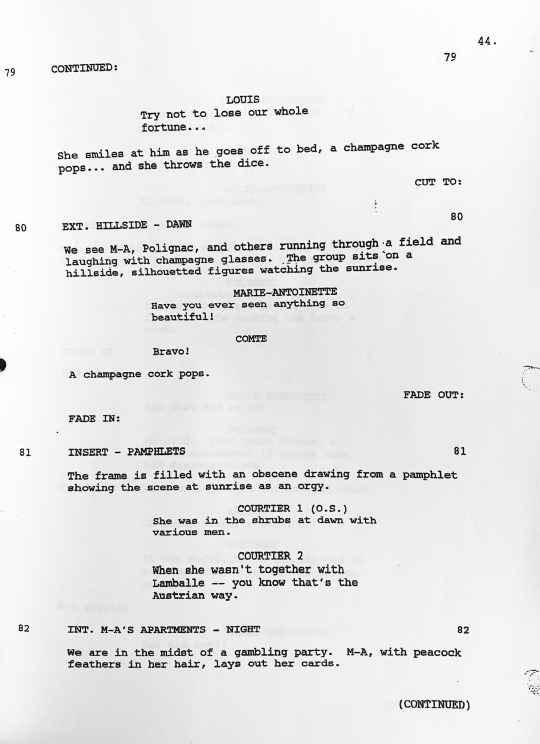
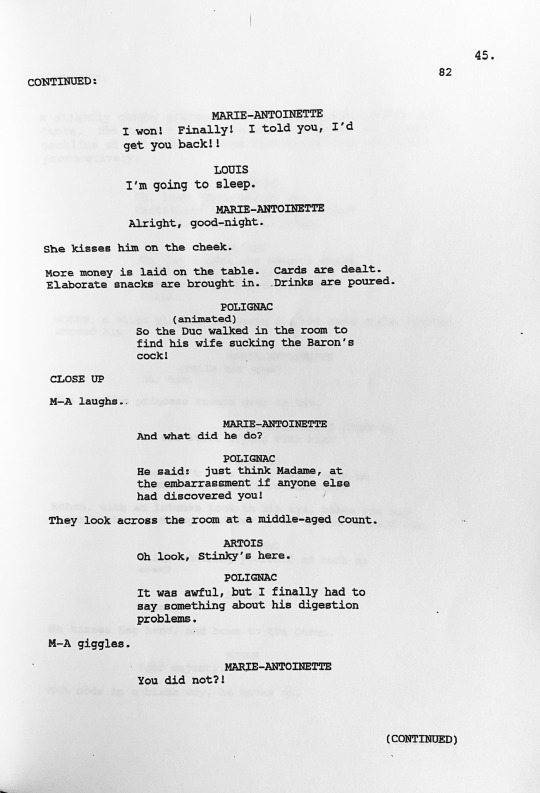

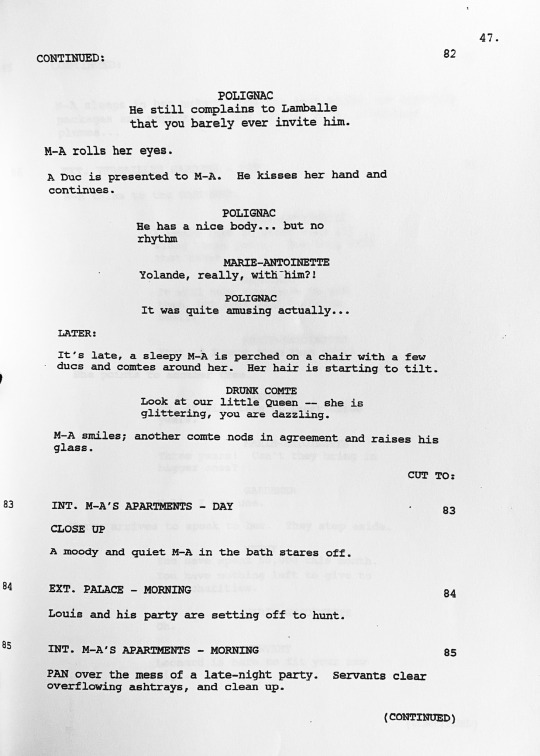
Significantly, MA is very much an observer in this scene, watching and listening but not involving herself in any reproachable behavior, which is an accurate portrayal. During the early years of the reign, she enjoyed the company (in addition to Lamballe, Polignac, and a few of her in-laws) of various older men of the court, almost all foreign and all able storytellers who regaled their young queen with stories of their experiences across the Continent. The baron de Besenval, the princes de Ligne and de Lauzun, the comte d’Esterházy, and the ducs de Coigny and de Guînes were all invited into the queen’s private apartments to entertain her with anecdotes of their travels and conquests, from Hungary to Switzerland and elsewhere through the European courts. None of them were considered suitable to be so intimate with MA according to etiquette, and she was severely faulted for this behavior by the royal court. She did not, however, ever allow herself to pass further than innocent flirtation with these men — Antonia Fraser speaks of the hysteria that MA had around her chastity. She sought the company of amusing, older men, but never in the context of adulterous behavior. They made her laugh and brought her levity, but if any of them ever crossed the line, they were very sharply and publicly reprimanded for their conduct.
One of the promotional stills for Scene 82 shows MA asleep, surrounded on all sides by men of the court, one of whom appears to be touching her. The image is another reason why perhaps this scene is supposed to walk the line between reality and fantasy … MA did surround herself with these men during her gatherings, but the physicality of the tableau suggests a bodily intimacy with these men that is definitely more in agreement with the vicious falsehoods spread by uninvited courtiers rather than historical fact. The scene feels out of place, as if the tone of this party isn’t consistent with the rest of the film — the conversation and behavior is much more extreme than anything else in Marie Antoinette, and this is perhaps intentional.
Why the scene was cut we do not know. It could have been due to pacing issues, since, with its inclusion, there would have then been two gambling parties back-to-back (which, again, may have been intentional — a more factual gambling party followed by a shocking illustration from a libelle, which is then followed by a fantasy gambling party to remark upon the different perceptions of MA’s lifestyle). It could be that the conversation was felt to be too vulgar, or at least vulgar in a way that stands out too much from the rest of the film. Or perhaps another reason entirely.
But the scene is important, as it’s a glimpse into what the public was guided to believe was the typical behavior of the queen of France, encouraged by the hands of the courtiers who were uninvited or ignored by MA.
Hopefully one day we get footage of this scene. I’m also curious if this scene was ever fully edited or if it was cut from the film before post-production was thoroughly on its way.



163 notes
·
View notes
Text
XVII-XVIII Century Royal Queer History
Unexpectedly to myself, I got really engaged in history of Europe of XVI-XVII centuries. I never really had much interest in kings and queens and didn't know much about them but once I began to read and learn about their personal lives, I got kinda hooked. Also, I was struck by how many of them were queer and I began to write down my findings, which inevitably turned into a freaking study. I thought I might as well post it.
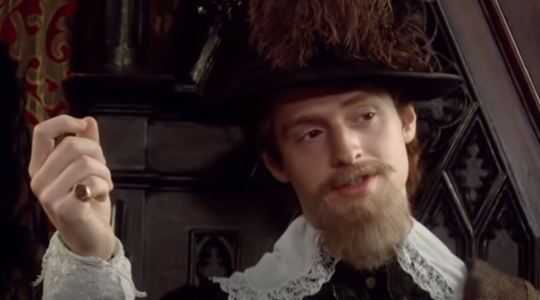
I'm gonna start with King James I of England who ruled in XVII century. Now there are several tumblr posts about this queer legend. Some historians think he was weak and unremarkable but he survived several assassination attempts, kept his power over 3 countries and lived to old age, which is pretty remarkable on its own. He also kept all the religious leaders at bay and commissioned the world's most famous Bible, which is still owned by most Christians 400 years later. He was also the one who created the modern wedding ritual. You know, church, vows, rings, that stuff. He avoided wars and was a patron of the arts, even wrote some books, including one about demons, werewolves and vampires. What a nerd. He was very different from Elizabeth who preceded him, so one contemporary epigram stated "Elizabeth was King, now James is Queen". Oh, also he was very gay. Or, at least, as gay as a king can get. His relationships with his male courtiers were notorious. He had several favourites who had way too much influence over him and his court really hated it.
He needs to have a movie made about him, seriously. I found only one semi-documentary film and it was The King James Bible: The Book That Changed The World (2011). While I liked the film and King James was hot, sassy and very cool, it was disappointing he was shown as perfectly straight. They could just avoid his personal life altogether, but instead they chose to show him being a perfect husband. While it is true that he was nice to his bride, by the time he met her he had a 10-year old relationship with a man 24 years his senior (since he was 14).
I'm just gonna use this screenshot from the movie instead of a painting because it's too good.
Perhaps the most notorious of his alleged lovers was George Villiers, 1st Duke of Buckingham. Starting out as a son of a minor gentleman, the 21-year old lad caught the eye of King James I and quickly became his favourite teasing him by dancing in intricate performances called masques. He made a brilliant career becoming a knight, an earl, a Marquess, and finally a duke - a title normally being reserved for members of the royal family - within just 9 years. Can you blame him though? I mean, look at that stud.
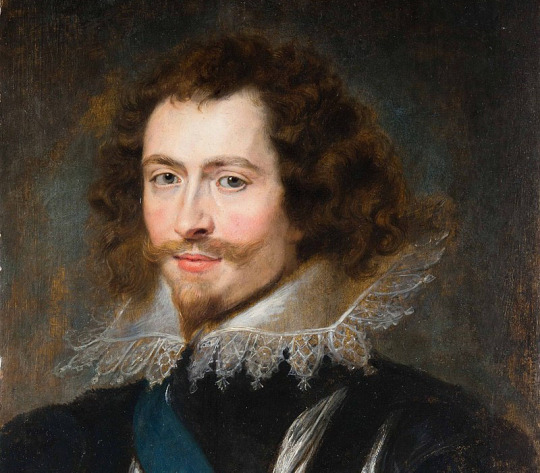
Btw, James’ pet name for Buckingham was ‘Steenie’, derived from St. Stephen who reportedly had the face of an angel.
The name Buckingham seemed oddly familiar to me but it took some time before I realized he was one of the characters in Dumas's "The Three Musketeers". Now I am someone who grew up on old pure Three Musketeers movies so when I started learning about the real historical figures involved in it it gave me a slight shock as the truth is way more weird and sinister that fiction.
The storyline I remember the most was the one where Anne of Austria, the queen of France, got in trouble with her husband Louis XIII because of her affair with Duke of Buckingham. Of course, Duke of Buckingham was never the Queen's lover, he was the King's. What's more, some historians assume Louis XIII was also queer. There is no evidence that Louis kept mistresses, but he had very intimate relationships with his favourites. He has even been described as “repelled by female contact”. There's also the issue of him struggling to have an heir. His wife had 4 pregnancies that were unsuccessful but that seemed like too few for a king who needed to secure his dynasty. After 23 years of trying, the king and queen were finally able to produce a son and another soon followed, the older son to become Louis XIV, and the younger, Philippe, to be known as Duke of Orleans.
Anne was quite the character for a dramatic story too. After Louis's death she became the Regent and made sure to clear the way for her son Louis. To ensure that Louis's younger brother will not try to usurp the power from him as it was with Louis XIII 's brother, Anne of Austria conducted an early and very wicked gender development experiment. She and her adviser, Cardinal Mazarin, set up a plan to raise the two boys very differently. Queen Anne called Philippe by such nicknames as "my little girl" and encouraged him to dress in feminine clothing, which he sometimes did even as an adult.
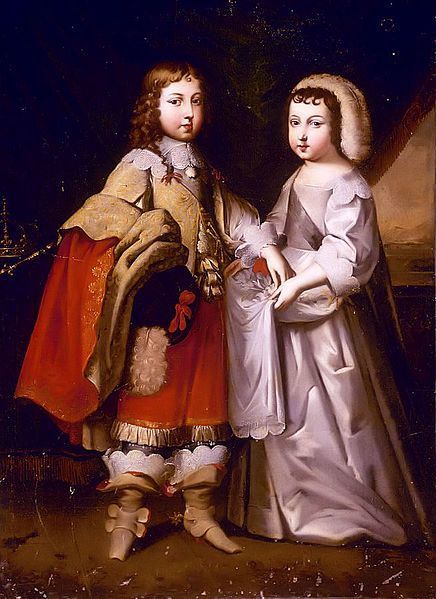
I'm just gonna use this quote because this shit is real:
The queen and Mazarin discouraged the duc d'Anjou [Philippe] from traditional manly pursuits such as arms and politics, and encouraged him to wear dresses, makeup, and to enjoy feminine behaviour. His inclination toward homosexuality was not discouraged, with the hope of reducing any threat he may have posed to his older brother. Reportedly, Cardinal Mazarin even commanded his nephew, Philippe, to de-flower the king's younger brother.
Well, fuck. The joke's on them though, as Philippe grew up to be a fashion icon AND a fierce warrior. He participated in many battles and was immensely praised for his bravery and valour. In 1677, he led the French forces at the Battle of Cassel against William III of Orange of the Netherlands. Yes, that guy who later gently invaded England and took the throne. By the way, there are some allegations that he was also gay. Anyway, Philippe was so badass in battle that people glorified him as a hero and it made his stallion of a brother so jealous he sent him back and never allowed him on the battlefield again.
Louis XIV continued his mother's effort in encouraging his brother's effeminate behaviour and putting up with his homosexual relationships, all the while waging a war of homosexuality in France. I mean, gotta preserve the traditional values, such as fucking 12 mistresses who were often married. There were even rumours Louis fucked Philippe's wife. I guess he was trying to make up for his father, brother, son, and uncle, César de Vendôme.
Meanwhile, Philippe gave no fucks. He had a number of favourites and didn't even try to hide his sexuality. In fact, it is said that every time Louis pissed him off, Philippe did something extra gay and in his face. Fierce.
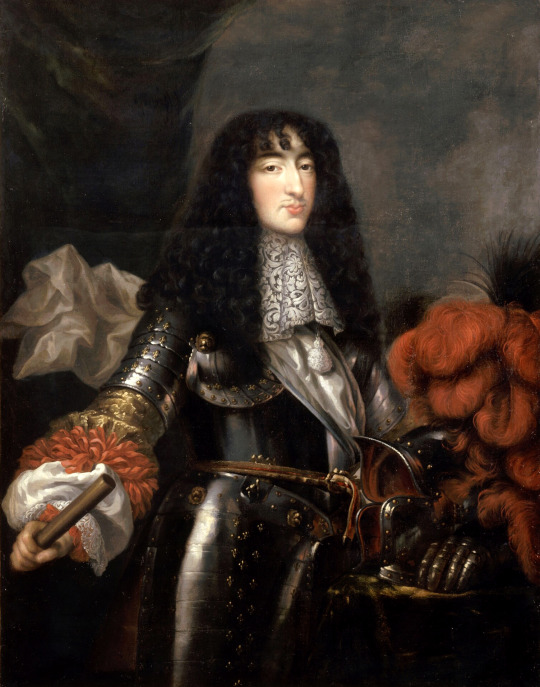
One guy I have to mention is Armand, the Comte de Guiche, who was said to be handsome, vain, and manipulative. Armand was Philippe’s lover, but he is widely thought to have been his wife Henrietta’s lover as well. That apparently wasn’t enough for the guy, because in 1665 he also tried to romance Louise de La Valliere, who was Louis’ chief mistress at the time. Louis exiled him in 1662 for plotting with Henrietta to break up Louis and Louise. What a glorious fucker.
But the love of Philippe's life was Chevalier de Lorraine who was basically a prince of a realm outside France. He's usually called 'Chevallier' but his name was also Philippe. He also had an older brother named Louis. Seriously, couldn't they try a little harder with the names? Anyway, when they met Philippe was 18 and Chevalier 15 and sparks flew. He was described as being “as beautiful as an angel” and was more than ready to use what his mama gave him. He was smart and very manipulative and Philippe showered him with gifts all his life, much to the chagrin of his two wives whose money and estates he often gave away.
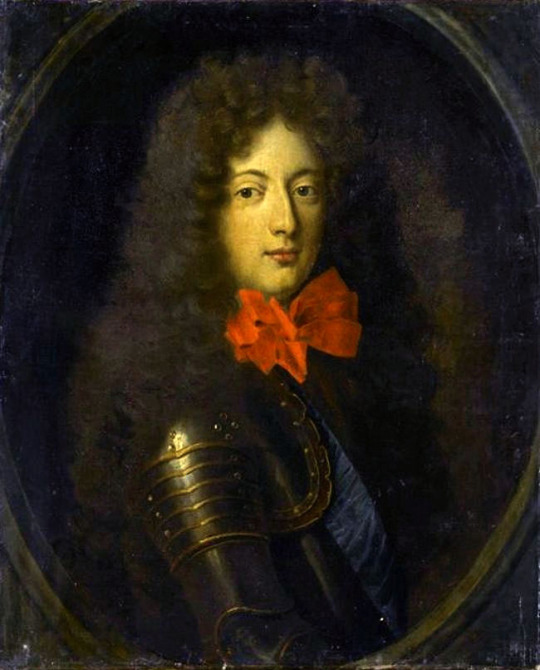
He moved to Palais-Royal, the same palace as Philippe and his wife Henriette. Very convenient. Philippe's marriage got kinda crowded. Chevalier got so arrogant, he actually told Philippe's wife she needs his permission to sleep with him and that he could get him to divorce her. She complained to the king and he got Chevalier imprisoned and exiled. However, not for long as Philippe pleaded the king to pardon him and eventually succeeded. Henriette did not get much relief apparently as she wrote: “I see from the ashes of Monsieur’s love for the Chevalier, as from the dragon’s teeth, a whole brood of fresh favourites are likely to spring up to vex me.” Of course, Chevalier also managed to enrich himself immensely by getting Philippe and the king to give him and his family tons of perks, such as make him the titular Abbot of four abbeys, which payed handsomely.
Henriette died very suddenly claiming she was poisoned. The doctors found no evidence of that, but there were still rumours that Chevalier was to blame. Philippe had to find another wife, even if he wasn't happy about it. Chevalier stuck around. He was exiled a second time after he apparently seduced the king's son (more on that later) but was able to return again. Their relationship lasted for 40 years, until Philippe's death.
There was a recent TV show called Versailles that depicts Louis XIV’s reign and it has a fairly accurate though romanticized portrayal of Philippe and Chevalier's relationship. Too bad the show is way too violent for me to watch. They look stunning in it~
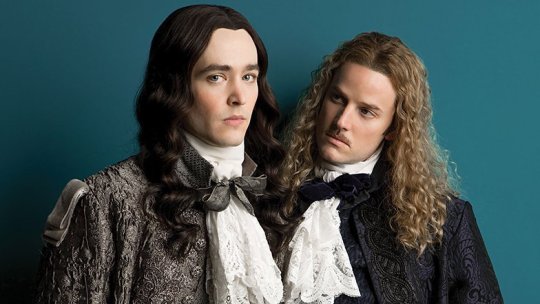
Anyway, such relationships were far from rare. In fact, apparently there were the so-called confréries (“fraternities”), which were basically gay brotherhoods whose members hung out together and set up orgies. One elite brotherhood was founded between 1680 and 1682. Apart from Chevalier, it included the king Louis XIV's cousin Prince of Conti who was once proclaimed the King of Poland, and Louis's illegitimate son, the comte de Vermandois. The latter was 15 in 1682 when at the court of his uncle Philippe, he met the Chevalier de Lorraine and his sect and apparently got very personally acquainted with Chevalier's younger brother and nephew. When the king learned about it, the group was forcibly dissolved and Vermandois was beaten before the king, exiled from court, and forced into marriage.
Another such group was within the highest ranks of nobility at the court of Philippe II, Duke of Orléans, the son of Philippe and the regent at the time when Louis XV was young. They really didn't bother with names, huh? Anyway, they got involved in a number of scandals, in one of which that happened in 1722 a group of 17 noble men gathered in the palace gardens to fuck. The Regent didn't seem very bothered and even seemed to find it amusing.
The Regent, who did not stop smiling, was satisfied that it was necessary to give the nobles a harsh reprimand and tell them that they do not have the best taste [goût] in the world.
Dad would be proud.
There were also some (presumably) queer queens, like Queen Anne of England. Now you might have seen the movie The Favourite but it's heavily satirized and Anne wasn't really childlike and helpless. Actually, this image was created by Sarah Churchill, Duchess of Marlborough, after she was expelled by Anne, and stuck. However, the rivalry between the old and new favourites was very real.
Anne met Sarah when she was just 8. Sarah was beautiful, charming and very persuasive. When Anne became the queen, she made Sarah Churchill her Mistress of the Robes (the highest office in the royal court that could be held by a woman) and gave her a bunch of other really cool titles. She also made her husband, John Churchill, a duke. Thus Sarah became the most powerful person in England after the queen and the queen always listened to her advice. However, as years went by, Sarah became increasingly pushy and insensitive, using the queen to get what she wanted.
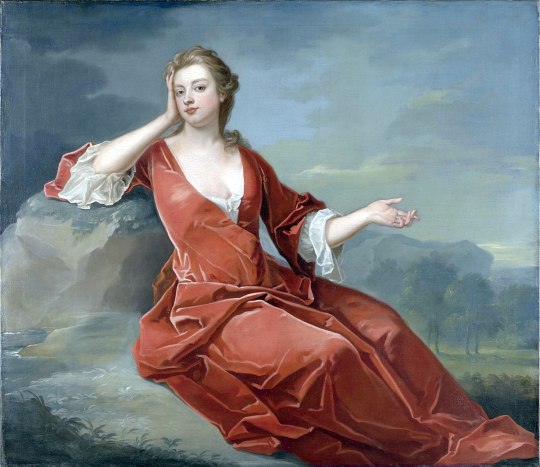
Sarah looking fab~
Then comes Abigail Masham, Sarah's impoverished cousin. Abigail was soft, caring and considerate, exactly what the queen needed. Sarah tried to get rid of her but it only angered the queen further and she eventually dismissed Sarah and her husband and banished them with disgrace while Abigale took her place. Sarah then wrote scandalous memoirs, painting the queen as weak and instable, as well as implying that her relationship with Abigail was lesbian. In mid-1708, she helped to circulate a ballad with such lyrics as: “Her secretary she was not / Because she could not write / But had the conduct and the care / Of some dark deeds at night.”
While there is no direct evidence that she and Anne had sexual relationship, there are many letters between the women that are very romantic and intimate. Sarah even used them to blackmail the queen. And you can kinda see why. “Tis impossible for you ever to believe how much I love you except you saw my heart,” the princess wrote in one letter, as quoted in Anne Somerset’s biography of Anne. “If I writ whole volumes I could never express how well I love you,” read another.
Also, like, evidence was hardly even a thing with queer relationships, since the only solid evidence of regular affairs were illegitimate children.
Finally, I really want to talk about Frederick II, the king of Prussia. Buckle up because this is gonna be long.
Until the age of 7 Frederick was growing up with his lit mother and sister. Here they are, looking gorge. I think he's in blue but tbh I'm not 100% sure.
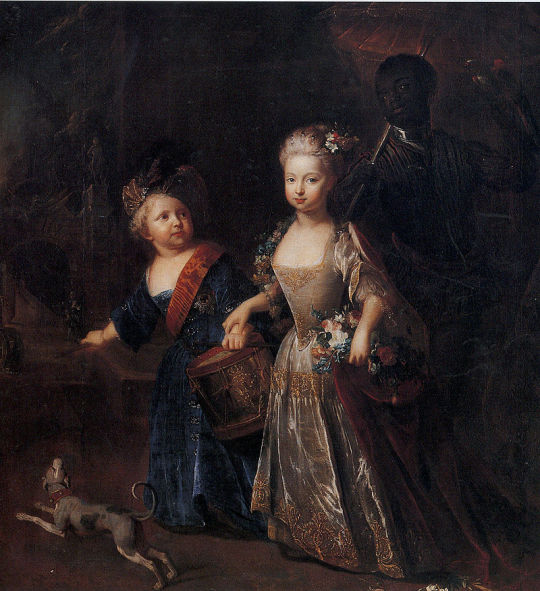
Anyway, as he got older he was taken to his father and that's when things got shitty. His father, Frederick William I, was the model image of toxic masculinity. He was all about power and military and expected his son to be the same. And since the boy was a lot more into music, poetry, and French stuff, his father often beat and humiliated him. He didn't allow him to learn French and Latin because, like, that's so gay. Now he was a real man. With a weird kink for tall guys. He is known for creating the Potsdam Giants, a regiment of very tall men that he didn't use for battle, just dressing them up and making them march. Ultimate straightness. It is probably redundant to say but his father also hated 'sodomy' and it was punishable by death, a law Frederick would repeal.
And the thing is, Frederick wasn't even supposed to become a king. He was the third son. It wasn't even disease. The first son died because a volley was fired close to his crib (because that’s the only way to wake up a real man - canon) and the second died at baptism because the royal crown crushed his skull. And you thought your parents were bad. Poor Frederick didn't even want to be a king, he just wanted to play the flute and do his thing. In a different age he'd be writing musicals on Broadway or something.
Anyway, there are few doubts among historians the man was gay. There's this BBC documentary that downplays it but it keeps saying he grew up in an environment where he was "leading a double life" and that he once wrote to a close friend that he felt he was a mirror that dared not be what nature made it, forced to oblige what was around it. Please.
Frederick's first presumed relationship was at 16, with Keith, the king's 17-year-old page. Unsurprisingly, Keith was soon sent to a far-off frontier. Right after that, however, Frederick got real close with an officer Hans Hermann von Katte. The dude was very woke and they both loved music and poetry but shit got very real very soon. In 1730, Katte and Frederick decided to flee to Britain to escape their despotic fathers. Sadly, they got caught and tried for treason. Although the prince was pardoned, Katte was sentenced to life imprisonment, which his sick dad changed to execution and then forced Frederick to watch it. At execution Katte and Fred shouted to each other endearments in French and before it happened, Frederick fainted. That shit really fucked him up and he got depressed but he toughened up and accepted his fate.
Aged about 20, Frederick was expected to marry. After a few failed attempts, an Austrian bride was selected, Elisabeth Christine of Brunswick-Bevern. Frederick was clearly unexcited and apparently even threatened suicide. As soon as he had secured throne, he sent her away and only met with her out of necessity. They had no children. And some historians are like, "well, they just didn't get along". Well, his folks hated each other but it didn't stop them from having 14 children.
Anyway, his father finally got off his back and as a crown prince, he mostly spent his time reading, composing, watching plays and writing woke political essays. Then his dad died so playtime was over.
Now that sounds like a story of a "weak" king. A man who loved to read books and play his flute. But it's not how it was. As Fred became king, he inherited a very militarized state with a huge-ass army and he worked with what he had. He started expanding Prussia, starting with Austria, which he had old beef with. He wasn't out for world conquest, he struck swiftly and strategically to consolidate and strengthen his state.
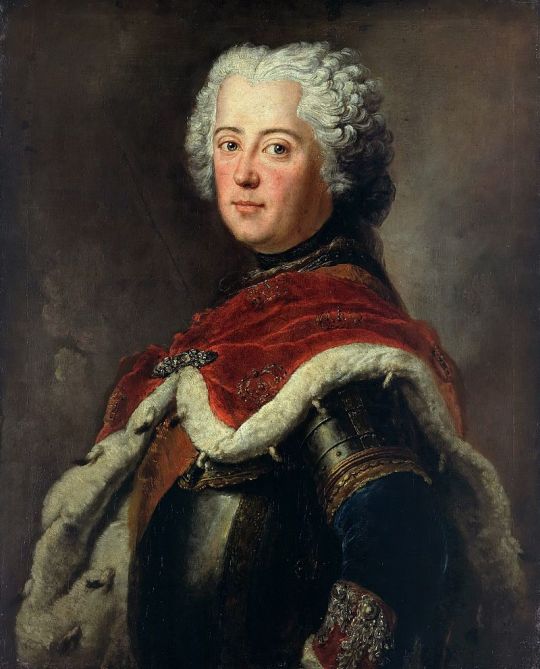
Frederick, widely known as Frederick the Great, waged war against much bigger armies with great success and doubled Prussia's size in his reign. Which is why Hitler was obsessed with the guy smh. Would make more sense if he was into the Frederick Senior, with his militarism and his little hobby of inbreeding giants and all. He must have missed the part where he was tolerant, modest and also gay.
Frederick also had a younger brother, Prince Henry, who was also gay. He was an important general in the king's army, though their relationship was quite complicated. Henry married but like his brother, bore no children, ignored his wife and spent time with fine lads.
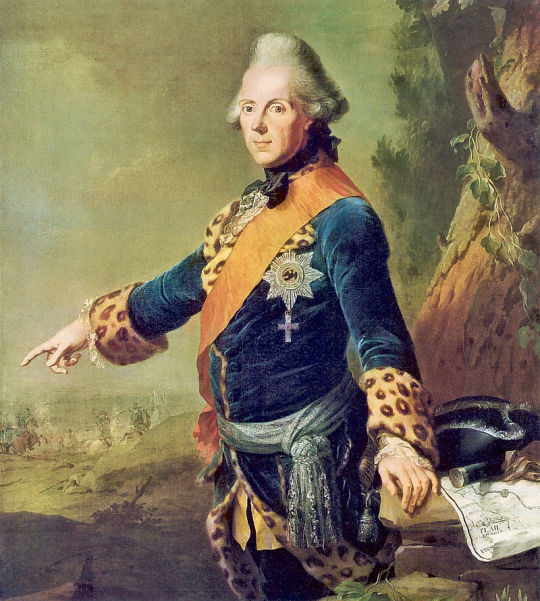
Look at this unapologetic legend!
When Frederick wasn't battling, he was doing lit stuff. He built a gorgeous palace in French fashion, full of Grecian sculptures and homoerotic paintings. He attracted the best intellectual minds of his time. Voltaire lived there for 3 years btw and he did not hold back to make many "wink wink" references to the king and his Grecian taste.
Speaking of which... One of his closest friends was Michael Gabriel Fredersdorf, an army private and a son of a peasant. Frederick met him as a prince and kept him by his side for the rest of his life, quite literally as he had an adjoined bedroom in his palace. He also made him a chancellor and gave him an estate, which really pissed off the elites.
Frederick is a complex character. Sure, he waged war and very successfully asserted himself as one of the top military leaders in history. But at the time Prussia was a scattered landlocked state, it couldn't just opt out of war so it's not like he could just go "peace out, bitches". But he did so much more. The guy actually believed that the king's duty was to be just and improve the lives of his people. He did some major reforms, improved education, supported art, and practiced religious tolerance, which was pretty woke at the time. He abolished torture and corporal punishment. He made governing more democratic by hiring people based on ability, not just status. Sadly, his cool legacy was utterly destroyed because the Nazi decided to appropriate him as their idol but lately it’s being reassessed. It’s hard to judge him considering how much he went through. But despite it all he became one of the best military commanders in history, one of the most woke and talented monarchs, and of course a legendary queer!
Disclaimer: I know all of these people did some terrible shit, at least by modern standards, but I'm here to have fun so I'm not going to go there now.
Sources:
medium.com/@LukeBoneham/the-politics-of-desire-...
thehistoryofparliament.wordpress.com/2019/02/21...
www.ranker.com/list/life-of-philippe-dorleans/m...
cour-de-france.fr/vie-quotidienne/sociabilite-e...
aelarsen.wordpress.com/2018/07/20/versailles-th...
thedrummersrevenge.wordpress.com/2007/06/22/ref...
dirtysexyhistory.com/2017/09/03/a-secret-gay-br...
unspeakablevice.tumblr.com/post/82525976110/lou...
journals.openedition.org/crcv/14427#ftn161
Marie Antoinette's World: Intrigue, Infidelity, and Adultery in Versailles
The Real Versailles - BBC Two
BBC Four - Frederick the Great and the Enigma of Prussia
https://medium.com/war-is-boring/historys-greatest-gay-general-fd7d1d311464
https://www.queerportraits.com/bio/frederick
https://www.spectator.com.au/2015/10/frederick-the-great-king-of-prussia-is-a-great-read/
http://gayinfluence.blogspot.com/2011/10/frederick-great-1712-1786.html
https://www.history.com/news/true-story-queen-anne-sarah-abigail-the-favourite-fact-check
#King James I#Duke of Buckingham#George Villiers#Philippe Duke of Orleans#Queer History#Chevalier de Lorraine#Queen Anne of England#Frederick the Great
105 notes
·
View notes
Note
Ok I realize: no further aid to Gil-galad —> little to no Eriador tree hacking on native lands for 205 years. Gardener or not, Ancalimë deserves a namesake tree to grow up with. 😉 Maybe Erendis influenced her in this but sadly didn’t get to see. 😭 But your 🥺 is making me soft…Both trees are named for the elven grandma and a queen? Nimloth-Ancalimë and Nimloth-Míriel. Elf-Dúnedain trees that inherited the Half-elven heritage and the spirits of Eldar women and Edain women of old.
I was about to say I had trouble imagining them naming the White Tree that grows from Isildur's sapling the same thing they called the previous White Tree, but then... I imagined Isildur and people in his family slipping and calling her that just out of custom, and... 🥺 You know what.... 🥺🥺🥺🥺 okay uwu I can see that!
Listen, this Ancalimë thing got my heart in such a grip, I keep thinking of Ancalimë going to the royal garden when she wants PEACE, seeing the White Tree that blooms at night and thinking about how she has no pair... Reigns alone in the garden... Ancalimë is a fun character because she contains so many contradictions, it's interesting to think that for all she seems to be really into queenship and ruling, she retains a love for aspects of her youth; I bet she retreated to the garden when she needed time to herself. I wonder if she would have more trees planted there! She's Emerwen, so I think of open lands good for shepherding, or at very least more of a love for meadows. How big is the royal garden? Is it something like the gardens of Versailles, with smaller thematic gardens? Is there a grove of trees somewhere, or around Nimloth? Or is Nimloth in plain sight? For some reason whenever I think of it, I think of elevated gardens, but the more I think about that the less it seems feasible... Now I'm thinking of the different things that were planted in the Garden and how it must have looked accross the ages and rulers and their families and friends!I bet Míriel was very interested in its upkeep, whereas someone like Ciryatan probably didn't give a damn, or had non-native plants put around. Adûnakhôr has every elven specimen besides Nimloth removed 🤪
Imagining that Middle Earth's forests never knew more peace than in the period from Ancalimë to Telperien, lol. But then CIRYATAN and the Guild of Venturers probably go all out, we never get anyone like them again :///
15 notes
·
View notes
Note
What are the most/least accurate historically inspired shows you have seen?
I can get over some in inaccuracies, I am not a history-Nazi. I can sit through The Spanish Princess and still enjoy it even if it is so inaccurate that I want to beat the writers and costumers over the head. Reign, Victoria, the White Princess, The White Queen and the Spanish Princess are probably the worst offenders. And HBO's Rome, (plot wise).
For accuracy, there is no show that's 100% accurate. The closest is probably The Crown though it does embellish. The Tudors has its high points but its pitfalls.
My official list is as follows:
I will star (*) any one that has trigger warnings such as sexual assault.
Elizabeth (inaccurate at times but worth a watch)
Elizabeth: The Golden Age (mixed accuracy, good costumes, Cate Blanchett is also my wife)
The Young Victoria (Mixed bag of accuracy but costumes are great)
The Duchess* (Aesthetics are good, can be boring at times)
Rome HBO * (can be very inaccurate but shows you a true look at Roman culture)
Victoria (Fine but inaccurate in places as well as being overpraising. Victoria did not help the Famine or feel bad about it and Melbourne was a slaving hoe-bag)
The Tudors* (has great accuracy in places, sometimes not. Recommend because its a good watch and Jonathan Rhys Meyers, Henry Cavill and Natalie Dormer are fucking great)
Dowtown Abbey* (Accurate and gives you the basics of Noble mumbo jumbo)
Medici (Great watch, slight skewed historical take)
The Borgias* (Sensationalized but clever and the costume porn is just *chef kiss*)
Marie Antoinette (Accurate in places, I'm fond of this film)
Memoirs of a Geisha* (watch this only for the aesthetics. NOT ACCURATE AT ALL but enjoy)
Versailles* (good show to watch for court politicking help)
Reign* (very fond of this show but so inaccurate that its down here for entertainment purposes only)
The Favorite* (love this film, some inaccuracies but gives you an insight into the court politics)
Mary, Queen of Scots* (has its problems but all together a good film)
The King (not accurate but fucking great)
Outlaw King (fine but would gave preferred an actual Scot to play Robert)
The Pillars of the Earth* (minor inaccuracies that I can live with)
The White Queen* (not terribly accurate but worth a watch)
The White Princess* (again it's not the most accurate but can be entertaining)
The Spanish Princess (not very accurate but is an ok watch)
149 notes
·
View notes
Text
Rating movies & shows about historical events that have little to nothing to do with the UK or North America but are a UK/American production for whatever reason
Reign (US, 2013 – 2017)

Focuses on Mary, (not quite) Queen of Scots, and her upbringing in France ca. 1557. I know very little about Mary, but enough that watching this show made my skin crawl. It’s honestly just an excuse for the CW (derogatory) to produce a ~steamy romance~ with a lot of mother-in-law drama and baiting you into sorting the primary love interests into the good boy/bad boy dichotomy, then it goes sike!, it’s actually the other way around, lol. That’s the cleverest it gets, really. The costume design is infamously horrendous. Whatever happened to the court ladies is just plain out wrong and I only skimmed the Wikipedia article on them about six years ago. Also everybody speaks British English even though they’re in France, even though the show is about Mary getting thoroughly baguette’d. What is an irony? Points for Catherine de’ Medici who’s played by Megan Follows and therefore automatically stanned by me because she starred in Anne of Green Gables once about 35 years ago. 3/10.
Marco Polo (US, 2014 – 2016)

“Inspired by Marco Polo’s early years in the court of Kublai Khan, the Khagan of the Mongol empire and the founder of the Yuan dynasty […] produced by The Weinstein Company […]”. I honestly got very very bad goosebumps when I read the synopsis for several episodes. This is a story about the Mongols who founded an important Chinese dynasty, and therefore the casting of several Chinese-(American) actors among Malaysian and Korean ones seems fine, but it sucks that there doesn’t seem to be single actor with Mongolian ancestry in it, especially when famous Mongolians are depicted. Points for Netflix actually casting an Italian actor as Marco Polo, the bar is so low, but I’m so impressed. Also points for this show making The Weinstein Company suffer a big financial loss. 2/10.
Vikings (Ireland/CAN, 2013 – )

“Inspired by the sagas of Viking Ragnar Lothbrok, one of the best-known legendary Norse heroes and notorious as the scourge of England and France.” My friends love this show, I’m bored by it. I haven’t watched more than two episodes and a few scene compilations. It doesn’t seem to be too far off even though the word “inspired” makes my alarm sirens go off, and I’m not exactly happy about the showrunner going “well, we don’t know for sure what happened, so I made a show about history but I changed bits so they it would be cool enough for the broader audience who doesn’t give a fuck about historical accuracy.” The earlier seasons also didn’t give a fuck about casting Scandinavian actors. I was glad to spot George Blagden though, who did a good job on Versailles. And they do have a cool intro. 5/10.
Versailles (CAN/F/UK/US, 2015 – 2017)
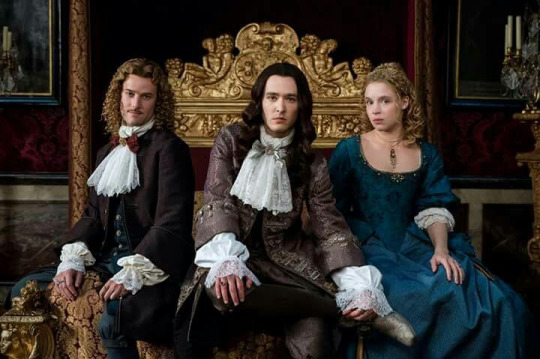
Takes place during the construction of the palace of Versailles and during the reign of a rather young Louis the XIV, also known as the Sun King. I have no idea what happens in this, because I came for the actual palace of Versailles and suddenly it was about everything but. I would honestly watch a drama about draining swamps, but no. I eventually ended up watching the whole show simply for two chaotic gays who have to enter a polyamorous business relationship with a German princess, which was an interesting and challenging dynamic, and has some historical facts at its core. Everybody speaks British English even though again, we’re in France. 6/10.
Troy (UK/US/Malta, 2004)

About the Trojan War. Stars lots of Americans but no Greeks. I don’t care much about heterosexual takes. 4/10.
Schindler’s List (US, 1993)

Focuses on Oskar Schindler, a German-Moravian industrialist who helped about 1200 Jewish people to escape the Holocaust during World War 2 by calling them “essential workers”. We get it, Americans love hero stories (as you can see on that movie poster, sigh). Unfortunately, Schindler isn’t that well-suited for the hero persona. He did take big risks, but he also profited from “keeping his Jews”; his memory pales in comparison to other people who weren’t even nearly as privileged as he was and risked much, much more. The ending scenes sucked ass. Mainly starring English speakers in German roles and Ben Kingsley as Itzhak Stern, a Polish Jew. Ben Kingsley also starred as German-Jewish Otto Frank in an Anne Frank adaptation. No comment. 4/10.
Suite Française (UK/France/Belgium, 2015)
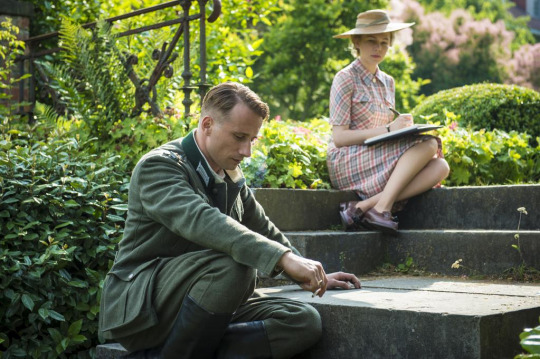
Based on Irène Némirovsky’s story about a Frenchwoman who’s estranged from her husband and her houseguest, a German officer and mysterious stranger, who fall in love during the Nazi occupation of France. Irène was a French writer of Ukrainian-Jewish origin who was murdered in the Holocaust before she could finish the story. The story is haunting, complicated, simmering with tension and good context, very well-made. However, everyone in this movie speaks British English, again - and in this case, it seems even more rude than in the other movies/shows. Bear in mind that this isn’t only a doomed, problematique ™ love story, but also a story about German-French relations. German and French people hate each other at this point because of their massive 1000-year-baggage, but they’re deeply intertwined. The adaptation could’ve involved undubbed German/French and included subtitles depending on whether the scene was about being understood or not; they could’ve demonstrated who speaks the others’ language very well (subs) or not at all (no subs). They could’ve emphasized body language for example, which could’ve been great in terms of the budding affair. This could’ve demonstrated the movie’s message and the German-French conflict in very powerful ways. Not to forget that stories like these often resulted in terrible treatment of those who chose (or were forced!) to be friendly with the enemy, which is a very sensitive topic in post-World War Europe and should be handled as such, by European actors, in my opinion. This is a vital thread in their historical fabric. TL;DR: This movie should’ve been handled by the German-French public TV channel ARTE, they would’ve rocked it. Instead, they chose US-American Michelle Williams to be the French protagonist, and Matthias Schoenaerts (Belgian) to be the German protagonist. Supporting roles were partly played by German actors, but they were made to speak English as well. Movie barely gets saved by the score and the overall story. 6/10.
The Great (US, 2020 - )
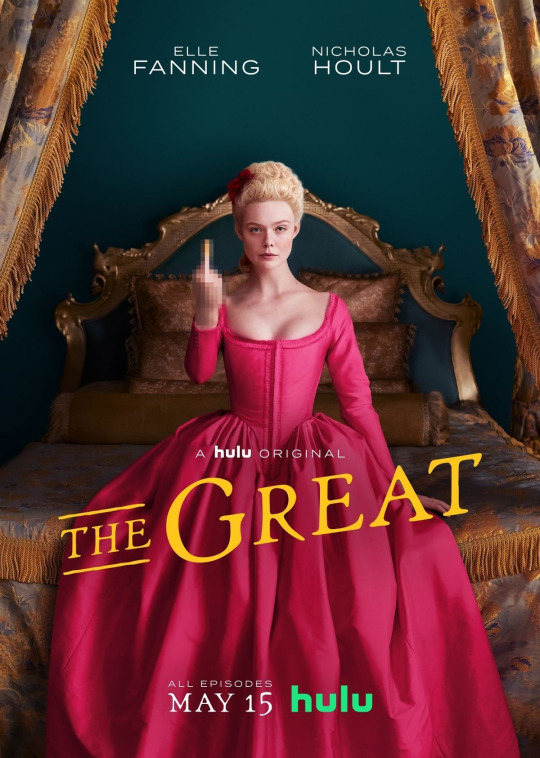
Loosely based on the rise of Catherine The Great, Empress of All Russia. This is a black comedy/satire, and it’s very important to keep this in mind. The show knows it’s balls to the walls and a historian’s nightmare, but its intended audience are drunk historians getting high on Elle Fanning and witty writing, and that’s where it succeeds. Nicholas Hoult as Emperor Peter is a revelation. Again, everybody speaks British English even though Catherine is German, the story takes place in Russia, and the most popular language among the characters would most likely be French. None of the cast is German or Russian – we’re noticing a pattern. I developed an embarrassing crush on Sacha Dhawan as Count Orlo who was supposed to be ugly but turned out to be ugly-hot. Watch it. 8/10.
#you're super welcome to make additions for chernobyl or the death of stalin or whatever#contrary to popular belief i haven't watched every historical show on this earth#and i probably forgot some of the ones i know#history
11 notes
·
View notes
Text
Anonymous asked: As a staunch royalist I would be interested to hear your views about Prince Harry and Meghan Markle deciding to quit the British royal family. Did they do the right thing or are they just being selfish and ‘woke’? Does this ‘Megxit’ the British royal family is in crisis and its future looks bleak by this act of betrayal to the Queen?
Short answer:

I have been avoiding answering this question precisely because I became tired of hearing about it around the family dinner table or with friends when I visited England recently or now with French friends here in Paris who can’t fathom what is going on. But too many have asked about this in my blog inbox.
I don’t mean to sound so dismissive but to me it’s just a passing storm in a tea cup rather than some cataclysmic crisis of the British monarchy. Everyone should stop take a deep breath.

After the joint press statement by Prince Harry and the Duchess of Sussex statement came out on 8 January 2020 it set in motion the usual hilarious pastiche of Cold War Kremlinology by the British press. So at any one time you had sensationalist and sanctimonious headlines such as the fury of the palace press knew no bounds. How dare they? The Queen humiliated. The palace insulted. And so on and so on.
Every newspaper editor knows there is a yawning gulf between the “public interest” and what interests the public. By any standards, Harry and Meghan have become huge celebrities. They were idolised, their charities blessed, their presence craved. Unfortunately such is human nature, the public invest something of themselves in their heroes. They see in their idols a reflection of their own fantasies and delights, hopes and fears. When they witness celebrities traumatised it can be unsettling, as the death of Princess Diana vividly showed. People cried in the street.
As Harry knew from his mother’s tragic experience, all this is par for the royal course. The British newspapers - or rather those peddling in royal tittle tattle such as the Sun, Mirror, and the Daily Mail - have a habit of erecting pedestals one minute and then the next minute they enjoy destroying the icon in the name of the public interest. Andrew’s former wife, Sarah Ferguson, was appallingly treated. So at times were Princess Anne, and Prince Edward’s wife, Sophie. Press attention should be water off the royal duck’s back. Prince Philip’s advice was reportedly: “Don’t read the bloody papers.”

While Harry was brought up surrounded by the furies of the celebrity media, Meghan’s career was the opposite. In her profession as a known actor (albeit a middling TV actor at that), image is an artifice, daily crafted and laundered by publicists.
This does not work with British royalty, which comes with its own carefully minted image attached. Its rituals are those of mind-numbing deference. It has no accountability. The only mirror it has is the press. The tabloids are the price that must be paid for adulation. They honour no discretion and have no sense of fairness. The press is a memento mori, whispering into the victor’s ear that he – or she – is only mortal. And gosh do they take that role on with sanctimonious glee.
To be daily compared to the Duchess of Cambridge, from an utterly different social background, must have been intolerable for Meghan: the dress comparisons, the stuffiness of the court, its hyper-caution and obsession with precedence and procedure, added to the impossibility of contact with ordinary people. As a self-made millionaire already perhaps she wanted to be more than a mere civil servant in a tiara. Perhaps it proved too much but who really knows? But then I don’t know what else she expected when she decided to marry into the British royal family.
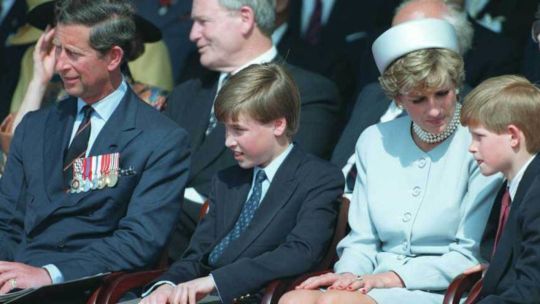
Similarly one can only speculate how much it was really Prince Harry who wanted to drop out riding on the royal carousel as he has been since birth. Regardless of who he married perhaps this was always the plan. His loathing of the British press and paparazzi is well known - he still blames them for his mother’s tragic death in Paris. It’s well known the paparazzi have tried to catch him out in manufactured scandals as he grew up. He has refreshingly come clean and has talked about how he still goes to therapy over his mother’s death. It’s no wonder he would ever subject a future wife and especially a child to the level of press intrusion that he had endured.
Prince Harry is nobody’s fool. I won’t say a bad word about him because - unlike previous and present royals with the exception of his grandfather, Prince Philip, who did active naval service during the Second World War and his uncle Prince Andrew, who as a naval officer flew Sea King helicopters during the Falklands War - he didn’t play the ceremonial toy soldier. After Eton he worked his arse off to get through Sandhurst and got commissioned with the Blues and Royals regiment. Upon the outbreak of war in Iraq, he was alleged to have said around 2006, “There's no way I'm going to put myself through Sandhurst and then sit on my arse back home while my boys are out fighting for their country.”
As it was the military chiefs got cold feet and pulled him out. But he did see active service with the British forces in Afghanistan with two tours. By all accounts he acquitted himself very well as a Forward Air Controller in Helmand Province and later as a co-pilot and gunner on Apache helicopters. He was widely respected and accepted by rank and file because he was down to earth and never asked for special treatment. He wasn’t a typical ‘Rupert’ - a squaddie’s nickname given to British army officers who typically came from privileged aristocratic backgrounds but were also ‘nice but dim witted’.

Overall I sympathise that the Sussexes’ predicament was clearly desperate, and it is perhaps to their credit that they have brought it to a head early and not let it drag on. I feel they are sincere in their reasons to ’step back’ from the royal family and frenzied media circus around it. The fact they want to pay their own way and pay back any outstanding sums back to the royal household is perhaps a sign of that sincerity.
Instead some sections of the British press rolled out the tired old trope of the parallels between the Duke of Sussex and his great-great uncle, the Duke of Windsor, are overwhelming. Once again, a dashing, sporting, ex-military prince leaves royal life for the love of an American divorcée. This is exactly the opposite of what Edward and Mrs Wallace Simpson did when they bit the hand that fed them. They took money to support their lavish lifestyle in exile from the Queen and all the while took every opportunity to snark the fledgling young Queen from their own alternative royal court in Paris. Harry no doubt loves his grandmother and his family and would try not sully the Windsor name.
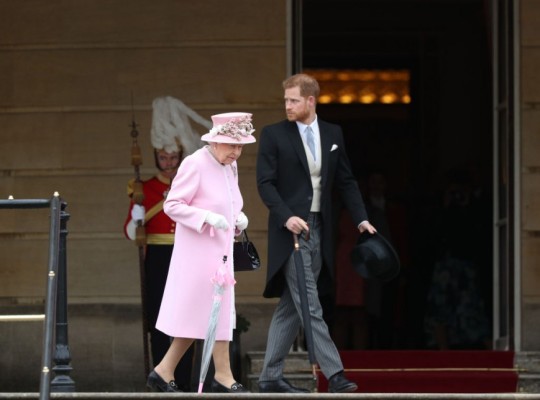
Where I would be critical a little is in their handling of it which appears naive at best and inept at worst. I suspect - since verified - that having a transatlantic split of publicists, and in addition didn’t understand the full import of how this would play out, would inevitably drop the ball. But I would extend a finger of blame to the palace courtiers who were involved in their own games of intrigue with a whispering campaign to selected journalists of the press. Indeed multiple newspapers, including the Daily Telegraph in the UK, reported that the queen was “disappointed” with the surprise announcement, and had asked the Sussexes to hold off on issuing a public statement. When The gossip mongering Sun newspaper published a front-page story that the couple was contemplating a move to Canada, the Sussexes pushed the button on their statement.
I do think the Sussexes and their advisors were fooling themselves into thinking that they could have their cake and eat it - in other words keep the royal titles but cut back on the public and ceremonial duties. The blunt truth is if you want to stay on the books, you do so by the leave of the firm and its boss i.e. The Queen. The contract is for life. If not, you resign. There is no half in and half out. This seems to have been the gist of the family only summit at Sandringham in January 2020, with media attention worthy of the Treaty of Versailles.

I am frankly surprised how worked up people are about this. Cut out the white noise and the picture is more prosaic.
The first point is that when all is said and done, none of this drama really matters. Politically, constitutionally, it is an irrelevance. Harry, at number six, is not seriously in line to the throne. The British monarchy has long shown itself immune to crisis; indeed I wonder sometimes if it welcomes crises as implying continued importance. The divorce and death of Princess Diana were awfully tragic, as was the very public shaming of Prince Andrew and his questionable friendship with billionaire paedophile Jeffrey Epstein. But how Harry leads his life is between himself, his wife and his father, Prince Charles. That is the point of heredity. It is immune to character, as it is to merit.
The second point is we should remember that other European royal families, of the same constitutional status as Britain, have been down sizing for many years now. These royal families balanced privacy and discretion whilst holding down ordinary professions. The King of the Netherlands, Willem-Alexander, is still an airline pilot. He occasionally flies KLM jets, safe in the knowledge that few people recognise him. In 2001 Prince Haakon, heir to the Norwegian throne, married a single mother with a drug-fuelled past. Despite some controversy, he survived incognito.

The King of Sweden, Carl XVI Gustaf, has reigned for 46 inconspicuous years as a nine-to-five job, his family merged into the Swedish bourgeoisie. The Crown Princess, Victoria, works intermittently for the UN. The King of Spain, Felipe VI, may have taken after his philandering father, Juan Carlos, but he became king without fuss on his father’s retirement in 2014. None of these “houses” has an extended state-subsidised royal family. None has grown unstable as a result.
There is no doubt that the exploitation of the British royal family celebrity by palace courtiers as PR handlers has worked. The royal family recognises that truth for itself when HRH King George VI famously quipped, “We are not a family, we are a firm”. The Queen is regularly cited as central to “UK plc” and to tourism. The British people remain overwhelmingly in favour of retaining monarchy as the focus of their patriotism, even during the wobble over Diana’s death. Republicanism is dead. The last ostentatious republican, the Fife MP Willie Hamilton, left parliament in 1987. If Scotland ever went independent it would almost certainly retain the Queen as head of state.
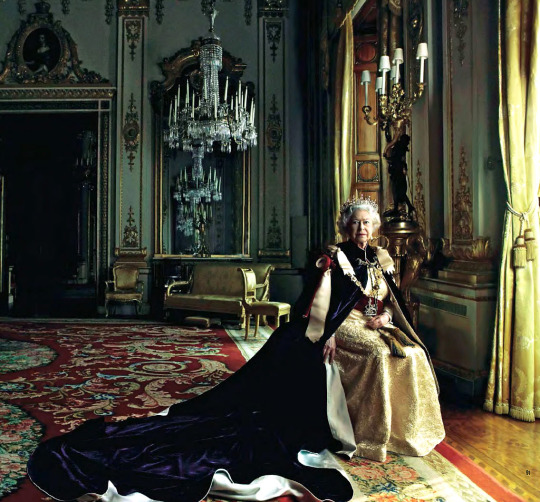
As for how royalty behaves, a constitutional monarchy should be beyond all controversy. As the great political and constitutional commentator (and founder of the Economist magazine) Walter Bagehot put it, “the monarch should be a dignified rather than efficient element of the constitution”. In other words, the monarchy as personified in its reigning king or queen can represent the whole nation in an emotionally satisfying way - everything else is but pure embellishment.
The Queen must be a glorious anthropomorphism of the nation as a whole. If she has opinions, she keeps them to herself - much to her credit. The contrast is clear with countries where state headship is combined with an elected executive presidency. The state risks being tainted by partisanship: witness the embarrassment many Americans feel at having their national loyalty identified with any president based on divided partisan feelings e.g. from FDR to Obama and Nixon to Trump.
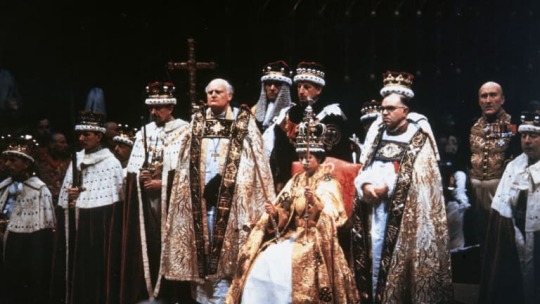
A rare occasion when the monarch might overstep the mark was conjectured by Mike Bartlett in his ingenious play, King Charles III, in 2014. It was based on the present Prince of Wales as king, refusing formally to sign a bill censoring the press (good on him). In the resulting crisis, William and Kate engineer Charles’s abdication, while the tearaway Harry takes up with a republican girlfriend. It was not wholly implausible. When Belgium faced a similar crisis over King Baudouin’s refusal to sign an abortion bill in 1990, he was allowed to abdicate for a day.
How the monarchy conducts itself is not wholly irrelevant. It is part of the collective context in which the nation’s politics are enacted. It represents tradition and upholds precedent. It sets boundaries and dictates a courtesy in the conduct of public affairs - however often that courtesy is infringed. What outsiders forget (especially our American friends) is that the British political system is gloriously resilient, as the past three years of Brexit hell have shown. It can tolerate the odd eccentricity, such as the blatant purchase of parliamentary seats in the House of Lords. But the question is how far such eccentricity can extend.

The present heir to the throne, Prince Charles, is deft at stepping mildly out of line. His views on architecture, health and the environment are not overtly partisan. But it does not matter as he is no more “powerful” than a newspaper or television commentator. His influence is that of celebrity. I would rather have the heir to throne engage intelligently in public debate than arrogantly indulge in the sordid sexual antics of his younger brother, Andrew.
For all his perceived faults, Prince Charles knows his limits. To expect such controlled nuances in the constitutional mystique of royalty to apply to an ever larger family has always been an accident waiting to happen. More prescient is the fact that the current system will impose the same disciplines and direct the same public exposure on an ever widening array of royal offspring as the years go by. I feel genuine sympathy for the royal children. Most British minors have their faces blanked out on camera, but not royal ones. They are sentenced to be recognised for life.
As a nation then we are extremely fortunate that Prince Harry is no more militant than in defence of the planet, wild animals and injured military veterans - all worthy causes if we are honest to admit it. Full disclosure: as an ex-veteran, I do give charitable donations to Invictus Games Foundation, the multi-sports event put on for wounded, injured or sick armed services personnel and their associated veterans. Prince Harry was instrumental in founding the Invictus Games in 2014 on his own initiative so that we never forget the courage and sacrifice of our military veterans.

What is already clear is that the Sussexes intend forthwith to redraw the lines of engagement with the press. They are opting out of the Royal Rota, the arrangement whereby, for decades, the royals have given access to a pool reporter from the national papers; instead, they will invite coverage from personally selected media outlets and will use their own social-media accounts, especially Instagram, to communicate directly with the public. Having railed against the media’s commodification of his wife, Prince Harry now seems prepared to take its commodification into his own hands: it was reported in January 2020 that he and the Duchess have lately submitted a trademark application for hundreds of items, from clothing to printed items, that may be issued with the couple’s personal brand, Sussex Royal.
This step is unfortunate and unedifying. To my mind, Sussex is a title, not a brand name. It is no more Harry and Meghan’s to exploit than Buckingham Palace is the Queen’s to sell off. Even if they distance themselves from the monarchy by being financially independent (as well as disowning their titles) by pursuing other commercial opportunities it only takes one scandal - e.g. a goods with their brand made from sweat shop labour or some other unforeseen PR disaster - to reflect badly on the Queen and the British monarchy solely because of Harry’s proximity to the throne. Harry may not be a Prince but he is a Windsor.

We are back to Bagehot again. For it was he who argued that the constitution was divided into two branches. The monarchy represents the “dignified” branch. Its job is to symbolise the state through pomp and ceremony. The government -Parliament, the cabinet and the civil service - represents the “efficient” branch. Its job is to run the country by passing laws and providing public services. The dignified branch governs through poetry, and the efficient branch through prose. The monarchy certainly doesn’t govern through commercial exploitation of its brand as an end in itself.
Today, the dignified branch is trying to adapt to an age of populism and until recently it’s been doing a much better job than the efficient branch. But the monarchy must never lower itself to the lowest common denominator to satisfy the base instincts of populism. As Bagehot aptly said, “An element of exaggeration clings to the popular judgment: great vices are made greater, great virtues greater also; interesting incidents are made more interesting, softer legends more soft.”
A family spat of no public importance is obsessing the nation and the world. Everyone should sit down and have a nice relaxing cup of tea.

#question#megxit#monarchy#britain#prince harry#meghan markle#duke and duchess of sussex#royalty#constitution#journalism
217 notes
·
View notes
Text
LÉOPOLD I
Duke of Lorraine
THE GOOD
(born 1679 - died 1729)

pictured above is a portrait of the Duke of Lorraine, by Nicolas Dupuy from c. 1703
-------------------- ~ -------------------- ~ --------------------
SERIES - On this day September Edition: Léopold was born on 11 September 1679.
-------------------- ~ -------------------- ~ --------------------
LÉOPOLD JOSEPH CHARLES DOMINIQUE AGAPET HYACINTHE was born on 11 September 1679, in Innsbruck at the Archduchy of Austria, part of the Holy Roman Empire.
His parents were Charles V, (titular) Duke of Lorraine and Archduchess Eleonore of Austria (former Queen Consort of Poland through her first marriage to Michał Korybut Wiśniowiecki, Monarch of the Polish Lithuanian Commonwealth) and thus he was a member of the HOUSE OF LORRAINE.
He was named in honor of his uncle Leopold I, Holy Roman Emperor and was born in Austria during his uncle's reign, because the Duchy of Lorraine had been occupied by France since 1670 and his father had exiled there.
In 1690 his father died an he inherited the titles of DUKE OF LORRAINE and DUKE OF BAR however he only recovered and took power of his territories by 1697, through the treaties of the Peace of Rijswijk.
By 1698 he was already back in Lorraine and negotiated his marriage to ÉLISABETH-CHARLOTTE, the MADEMOISELLE OF CHARTRES, the youngest child of Philippe I, Duke of Orléans and Princess Elisabeth Charlotte of the Palatinate. They had fifteen children (check the list below).
Though Lorraine and France enjoyed a period of peace, in 1701 the Spanish War of Succession reinstated tensions. The Lorraines were linked to the Austrian Habsburgs who were fighting for the Spanish throne against the Bourbons, and so France invaded parts of Lorraine again but this time the Duke was not forced to leave.
Between 1703 to 1723 he rebuilt the Château de Lunéville, at Lunéville, the capital of Lorraine, inspired by the Palace of Versailles.
At the early 1720s he initiated negotiations for the marriage of his son and heir Léopold-Clément, Hereditary Prince of Lorraine to Archduchess Maria Theresia of Austria, the heiress of Holy Roman Emperor Karl VI. However his son died in 1723 and another son François Étienne, the new Hereditary Prince, took his brother's place in the negotiations.
The Duke of Lorraine died before any agreements were settled in 1729, aged 49, at the Château of Lunéville.
-------------------- ~ -------------------- ~ --------------------
François-Étienne succeeded him as the new Duke François III and almost a decade later married Archduchess Maria Theresia. Through their union the House of Habsburg-Lorraine was founded.
After the death of Emperor Karl VI, his son the Duke of Lorraine was elected and crowned as Franz I, Holy Roman Emperor and because of this, since 1745 every Holy Roman Emperor and Emperor of Austria have been his descendant.
-------------------- ~ -------------------- ~ --------------------
LÉPOLD and his wife ÉLISABETH-CHARLOTTE had fifteen children...
Léopold, Hereditary Prince of Lorraine - died aged seven months;
Élisabeth-Charlotte of Lorraine, (titular) Abbess of Remiremont - died aged ten;
Princess Louise Christine of Lorraine - died aged one month;
Princess Marie Gabrièle Charlotte of Lorraine - died aged nine;
Louis, Hereditary Prince of Lorraine - died aged seven;
Princess Josèphe Gabrièle of Lorraine - died aged three;
Princess Gabrièle Louise of Lorraine - died aged three;
Léopold-Clément, Hereditary Prince of Lorraine - unmarried;
Franz I, Holy Roman Emperor - husband of Maria Theresia, Queen of Hungary and Bohemia;
a daughter - died aged one month;
Princess Élisabeth-Thérèse of Lorraine - wife of Charles-Emmanuel I, King of Sardinia;
Prince Charles Alexandre of Lorraine - husband of Archduchess Maria Anna of Austria;
Princess Eléonore of Lorraine - died aged twenty five days;
Anne-Charlotte, Abbess of Remiremont - a nun; and
a stillborn daughter.
#leopold i#duke of lorraine#duchy of lorraine#lorraine#house of lorraine#french royals#royals#royalty#monarchy#monarchies#royal history#french history#european history#world history#history#history lover#holy roman empire#louis xiv#monsieur#17th century#18th century#history by laura
3 notes
·
View notes
Text
Berthier through the Revolution - Part 1: surviving in Versailles.
[..] The Revolution catches up with him. After the storming of the Bastille, La Fayette was appointed by acclamation commander of the citizen militias, bourgeois militias which later became the national guard. [..]
Events accelerated: on October 5 and 6, 1789, the starving women of Paris forced the gates of the Palace of Versailles and brought the royal family back to the capital. La Fayette, overwhelmed, had to bow to the will of the crowd, escorted them to the Tuileries, abandoning Versailles. He needed a trusted person to watch over the security of the city, the castle and the royal properties. On December 25, 1789, Berthier was appointed aide-marshal des logis, then two days after interim commander of Versailles under the direct orders of La Fayette, who was then commander of the national guards of the whole country.
The job was not easy, however: the troops were poorly disciplined and agitated by extremists, such as his deputy, a trader named Le Cointre. The latter tried by all means to undermine the authority of Berthier, yet appreciated for his moderation and his enlightened patriotism. All the pretexts were good [...]
The Berthiers, though supported by the mayor of Versailles, Jean François Coste, chief medical officer of the armies with whom Alexandre had bonded in America, had to face the worst calumnies during the year 1790. Moreover, an event almost caused the definitive downfall of the commander of the national guard. At the Château de Bellevue lived apart the two last daughters of Louis XV, Mesdames Adélaïde and Victoire. These, after much hesitation, were preparing to emigrate. The National Assembly gave its assent after a long agitation in January 1791. The agitators like Le Cointre obviously did not have any of it. A rumor circulated that the Ladies were leaving with quantities of bags of gold and tensions flared. On February 19, 1791, incidents multiplied: groups of dissenters assembled to prevent their departure and marched on Bellevue. At the head of a detachment, Berthier intervened, protected the two old ladies from looters, then their luggage, and Bellevue's furniture. Faced with the dissenters, a part of his mutinous troops, Berthier was able to show determination, presence of mind once again, receiving the praise of the royalists and the harsh criticism of the dissenters.
Le Cointre and his friends relaunched their attacks against Berthier, multiplying the demonstrations in March-April where cries of "Down with Berthier!" or "De Berthier, à la lanterne!" * burst forth and where women, vociferating, bombarded him with mud. Petitions circulated, a delegation from Versailles even went to the Jacobins club to call Berthier a "despot", a "vizier" ...
[..]
However, Berthier grew tired of this permanent struggle and prepared to resign from his post, which was too political for his liking. His relations with La Fayette allowed him to bounce back. During this period, the latter repeated his request for promotion, made in the fall of 1790 to the Minister of War in a letter in which he recalled Berthier's conduct during his command in Versailles:
"His conduct perfectly justified the choice which had been made of him for these two places. He maintained good order, intelligence, even rule and discipline among the regiment of Flanders, very prone to insubordination, and among the other corps in garrison at Versailles. His prudence and firmness prevented the riots of the people, security reigned in the city and in the surroundings. The king and the queen were kind enough to testify to Sieur Berthier their satisfaction on the state in which they found the surroundings of Versailles. The rank of colonel given to Sieur Berthier cannot give rise to any complaint. "
Franck Favier - Berthier, l’ombre de Napoléon.
Note:
A la lanterne! : Lanterne is a French word designating a lantern or lamp post. The word, or the slogan "À la lanterne!" (in English: To the Lamp Post!) gained special meaning and status in Paris and France during the early phase of the French Revolution, from the summer of 1789. Lamp posts served as an instrument to mobs to perform extemporised lynchings and executions in the streets of Paris during the revolution when the people of Paris occasionally hanged officials and aristocrats from the lamp posts. The English equivalent would be "String Them Up!" (British) or "Hang 'Em High!"(American)(Source: Wikipedia)

#xviii#french revolution#franck favier#berthier l'ombre de napoléon#louis alexandre berthier#la fayette#berthier does a good job in difficult times#meets violent hostility#death threats
12 notes
·
View notes
Text

Under the cut: you will find a lengthy, yet concise summary of the historical life and rule of Louis XVI.
*** While this is not a mandatory read - it is interesting and will be referenced in most threads outside of the Modern AU, ( which must be requested to write in. ) Some knowledge may benefit you to know if you don’t have a good base in the history of the french revolution. I may add to this as I gain more sources and insight into the King’s personal life. ***
Name: Louis Auguste de France
Other Names: Louis XVI || Citizen Louis Capet ( Before Execution )
Titles: Duc de Berry ( Given at birth ) || Dauphin ( After his father died ) || King of France ( After his grandfather died )
Birthday: 23rd of August 1754 || Reign as King lasted from May 10th 1774 - September 21st 1792
Died: January 21st 1793 || Execution By Guillotine
Religion: Roman Catholic
Family Ties: House of Bourbon
Siblings: Louis XVIII Comte de Provence, Charles X Comte d’Artois, Élisabeth de France, Louis Duc de Burgundy ( Died at 9 ), Clotilde de France, Xavier Duc de Aquitaine ( Died at 1 ) , Marie Zéphyrine de France ( Died at 5 ), Marie - Thérèse de France ( Died at 2 ).
Parents: Marie-Josèphe of Saxony & Louis the Dauphine of France
Spouse: Marie Antonia Josepha Johanna || ( French Version ) Marie Antoinette ( Second Cousin, Once Removed. )
Biography:
Often passed over in favor of his older brother Louis ( Duc de Burgundy ) because he was more outgoing, handsome & intelligent. Tragically, he died at 9 & favor was shifted to the new future Dauphin. Louis Auguste was by all accounts a healthy but painfully shy & reserved child. He was equally as bright as his brother excelling in: Latin, History, Geography, Astronomy. He was also fluent in English & Italian. ( Louis liked to wrestle with his brothers & hunt with his grandfather. ) His special interest was in locksmithing & this was encouraged by those around him as a worthwhile pursuit even in his childhood. The subjects he was taught by the Duc de la Vauguyon additionally included: Religion, Morality & Humanities.
Louis married Marie on May 16th 1770 when he was just 15 and she was 14. By the time the two were married to form the French & Austrian alliance: the defeat of France, in the 7 years war had already made the French public view the new Dauphine as an unwelcome stranger to the country.
The couple only met 2 days before their marriage, and for this reason the marriage was cordial but very distant in the beginning. Louis was shy & also afraid of being manipulated by Marie for stately purposes --- this made him act coldly towards her in public. They did eventually foster a fondness for each other & their marriage was consummated in 1777.
( Louis XVI & Marie Antoinette’s reputations were damaged because they did not produce heirs in a traditionally ‘ timely manner ‘. )
After gentle prodding from Marie’s brother, Joseph II --- Louis began to take his conjugal duties seriously and Marie fell pregnant, eventually giving birth to 4 live-born children. ( Marie suffered 2 miscarriages and Louis - by all accounts - consoled her each time. ) Louis XVI also ‘ adopted ‘ six children additionally, though they were never granted royal status.
Louis took the throne in 1774 at age 19 after his grandfather died. By then, there was already resentment among the public for the royal family, lots of government debt incurred before he was installed as monarch, and so much responsibility that Louis himself did not feel ready & prepared to take on.
Louis XVI’s indecisiveness & lack of firmness - though grounded in the idea he wanted to be liked & loved - ultimately, led to part of his downfall. ( It should be noted Louis Auguste DID genuinely attempt to be a good and just king, the circumstances that line up before his assent to the throne were too vastly stacked against him. )
Louis reinstated the ‘ parlements ‘ & put a more experienced advisor in place to ensure that things were fair and on the up and up. Louis also signed the Edict of Versailles || Edict of Tolerance that allowed Non-Catholics to have the legal right to practice their faith(s), as well as restore legal/civic rights and status to them. This overturned the Edict of Fontainebleau which had reigned as law for a little over 100 years. While the Edict of Versailles didn’t claim freedom of religion - it decriminalized the practice of other religions and helped ease tensions based on religious differences in the country.
Radical financial reforms were a steadily growing need in the country because of the mounting debt ... the nobles refused to instate the necessary laws ultimately culminating in further dissatisfaction among the public and stoking the flames of the oncoming French Revolution. The publication of ‘ Le Compte - rendu au Roi ‘ -> ‘ The Records of Accounts for the King ‘ further ruined the monarchy’s reputation by publishing propaganda that was full of fictitious & inaccurate budgets meant to make France look more financially stable than it was. When the true extent of France’s debt was revealed: the common man & many nobles alike were shocked and disgusted, the nobility outright rejecting the reforms necessary to begin to rectify the scenario.
Finally, the country’s finances reached an appalling low --- and Louis was forced to use his absolute powers to force reforms, though they could only be maintained for more than 2 - 4 months maximum before he would be forced to revoke them. He closed down the french parliamentary system. The royal treasury was also unable to sustain the reforms imposed because it was in a crippled state as it was.
After much abuse from the the First & Second Estates ( after Louis reinstated the Estates-General ) the third estate decided unanimously declared themselves the National Assembly. Soon after Louis lost control of this newly formed legislative body - the revolution was underway and officially began with the Storming of the Bastille on July 14th 1789.
Louis Xvi’s Palace de Versailles was stormed by an angry mob on October 5th 1789. This was done in an attempt to kill Marie --- the now much hated symbol of frivolity to the French public. After the Marquis de Lafayette diffused the situation - the royal family was forced to move themselves to the Tuileries palace in Paris.
While plenty of key figures besides the king and queen attempted to gather strength to restore the former absolute power of the monarchy --- it would ultimately fail and many of these secret supporters either retracted loyalty to the crown under threat of death, or met grisly ends by the hands of the public & new governing body. Louis, finally realizing the danger he and his family were in and wanting to regain control of France - helped Axel von Fersen ( a rumored lover to the Queen ) plan the royal family’s escape to gather forces and gain protection by Austria. After a series of setbacks, missteps, poor judgements, indecision, and assorted other issues behind the scenes - the family was caught and returned to Paris ( Tuileries Palace ) on June 25th 1791 and placed under highly monitored ‘ house arrest ‘. It didn’t help that before they left, Louis left a manifesto denouncing democracy and asserting his authority as king by birthright. Many of his subjects felt torn and confused, though remained loyal ... until this incident in which the revolution was known to be imminent.
All in all, the call to arms fell on inactive deaf ears amid among other foreign monarchs, making the response woefully lackluster and this ultimately sealed the fate of the French aristocracy. On August 10th 1791, the people once again stormed the palace Louis and his family resided in forcing them all to take refuge with the Legislative Assembly.
Louis was officially arrested on August 13th 1792.
September 21st 1792 - the former Third Estate’s new government body the ‘ National Assembly ‘ announced France a republic and abolished the monarchy altogether. All of Louis - Auguste’s titles were taken and he was referred to as Citoyen Louis Capet. While many members wanted the gratification of executing the former king --- the fact some had backgrounds in legal work felt due process a necessity. An agreement was reached that there would be a trial for Louis before the National Convention.
Several charges were brought against Louis while he was being tried, though there were only three questions that mattered to the assembly:
1| Is Louis guilty ?
2| Whatever the decision, should there be an appeal to the people ?
3 | If found guilty: what punishment should Louis suffer?
On the 26th of December 1792, Louis responded tot he charges: Not Guilty. At this time, behind closed doors - he had already accepted his fate & knew that he would be found guilty. He was reported as wanting to hold his ground so that he might still be viewed favorably and as a good king to France.
Voting took place & after an uncomfortably close call - Louis was sentenced to death by the majority of one vote: his own cousin, the former Duc d’Orleans, voted to have his cousin executed immediately. After an unsuccessful attempt at swaying the decision - the King’s council was resigned ( read as: ‘ forced ‘ ) to allow the execution to proceed.
On Monday, January 21, 1793 --- The ( Former ) Sun King was executed by Guillotine at age 38. This happened on the Place de la Révolution. By most reputable accounts, Louis faced his death with resignation and dignity. He gave a small speech before hand and was stopped before he could complete it with a drum roll that signaled the Guillotine was ready.
After the execution, his body was taken to Madeleine Cemetery where he was given a small secret funeral service and then buried in an unmarked grave, head between his feet and covered in quicklime.
The cemetery closed in 1794. 21 years later, Louis XVIII had his brother and sister in law exhumed and reinterred in the Basilica of St. Denis. From 1816 - 1826 a monument honoring the King and Queen was erected in the same area the former cemetery and church occupied. It was named the ‘ Chapelle Expiatoire ‘.
#• Le Tendre Soleil Se Lèvera Á Nouveau. • ( Louis Auguste || Louis XVI. )#• You Can't Play My Cabinet Like A Harpsichord ... • ( NPCs. )#• Why Do Americans Think They Know It All ? • ( OOC Historical Rambling. )
4 notes
·
View notes
Text
The Cinderella Story of Jeanne Antoinette Diane Phélise de Esch-sur-Alzette
Long before Jeanne Antoinette or Philippe Alexandre were born, her mother Madeleine de La Motte was a lady-in-waiting to Queen Elisabeth of Lützelburg. Madeleine was exceptionally intelligent, an accomplished poet and philosopher who advocated passionately and eloquently for the rights of women. She and the Queen were inseparable until Madeleine had the misfortune to fall in love with and become pregnant by the rakish Jean de Esch-sur-Alzette. Though they married it just barely covered up the scandal surrounding the match.
Queen Elisabeth was forced to publicly abandon her friend though not in private frequently sending money to keep her friend and her young daughter afloat while Jean drove the family into debt.
The loyalty proved wise, because when Queen Elizabeth was forced to flee Lützelburg Madeleine opened her home to her and her son despite the fact her husband was fighting in opposition to Elisabeth’s husband, Augustus II during one of the countries succession crisis and civil wars.
Elisabeth stayed with her former lady-in-waiting for three days while her and her son’s journey to France was arranged. During those three idyllic and anxious days, Madeleine’s daughter Jeanne Antoinette and Prince Philippe Alexandre formed an attachment. Though both children were both little more than seven years old, Philippe gifted her with a gold ring his mother charitably donated for the occasion.
Over the next several years, Philippe grew up in the salons of Paris and the court at Versailles while war raged at home becoming more and more engrossed in the enlightenment philosophies setting the western world aflame. While Jeanne Antoinette came of age in war ravaged Lützelburg, her mother guided her education along her own radical lines until her death when Jeanne Antoinette was twelve. By then her father Jean de Esch-sur-Alzette had fled to the Americas having racked up debt and enemies on both sides of the still raging civil war.
Penniless, of questionable legitimacy and born to a radical thinking mother and libertine father Jeanne Antoinette was sent to live with her mother’s sister, Marie Marguerite. Embarrassed by Jeanne Antoinette’s scandalous origins but unwilling to turn her niece Marie Marguerite sent her first to a convent school and then had her act as governess to her younger cousins, refusing to introduce her into society.
And then the war ended with Augustus II securely seated on the throne.
Triumphant, Augustus planned a series of nationwide celebrations not only to celebrate his victory but also the returns of his Queen and heir, Philippe Alexandre. Naturally the Queen and Crown Prince wished to invite Madeleine and her daughter only to be informed of Madeleine’s sad fate. Jeanne Antoinette proved harder to locate and when they were able to track down Marie Marguerite. For three nights a royal ball was held, with Marie Marguerite attempting to pass off her two oldest daughters as Jeanne Antoinette. However the ruse was found out when neither produced or knew of the ring Philippe had given Jeanne when they were children.
Suspicious, Elisabeth herself went to Marie Marguerite’s home on the day before the third night and found Jeanne Antoinette. Delighted Elisabeth took her back with her to the palace and had her attended to by her own hairdressers and fitted one of the dresses Madeleine had used to wear for her.
Philippe was enchanted with the woman his childhood friend had grown into and delighted when she produced the ring he had given her so many years before. She became his almost constant companion, and ward to the Queen. It wasn’t long before Philippe became determined to marry her, only to have his plans discovered by his father who was adamantly opposed to the match. Even Elisabeth argued against it but Philippe remained determined even threatening to abdicate instead of taking the throne which would ignite another succession crisis that would lead once again to civil war.
Having grown up during the previous war, Jeanne Antoinette produced a solution of her own. She married the aging Duke Charles Guillaume de Brézé. The move caused a rift between her and Philippe for several months though now that marriage was off the table Queen Elisabeth encouraged the two to reconcile and Jeanne Antoinette herself was able to persuade Philippe of the wisdom of her decision. The incident established their pattern for the rest of their lives, though both eventually married others, Jeanne would continue to advise Philippe and temper his idealism and passionate nature to ensure not only that his people enjoyed a peaceful reign but to create an equally peaceful future for their country.
#my fanciful dove has tears in her eyes {jeanne antoinette headcanon}#how it is; how it was; how it will be {philippe alexandre headcanon}
3 notes
·
View notes




